




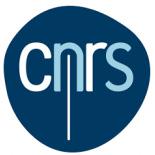
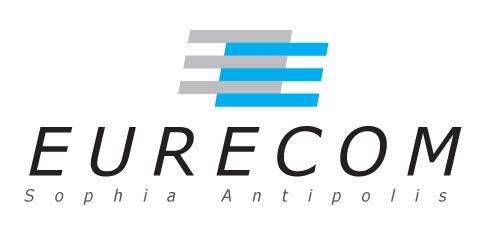






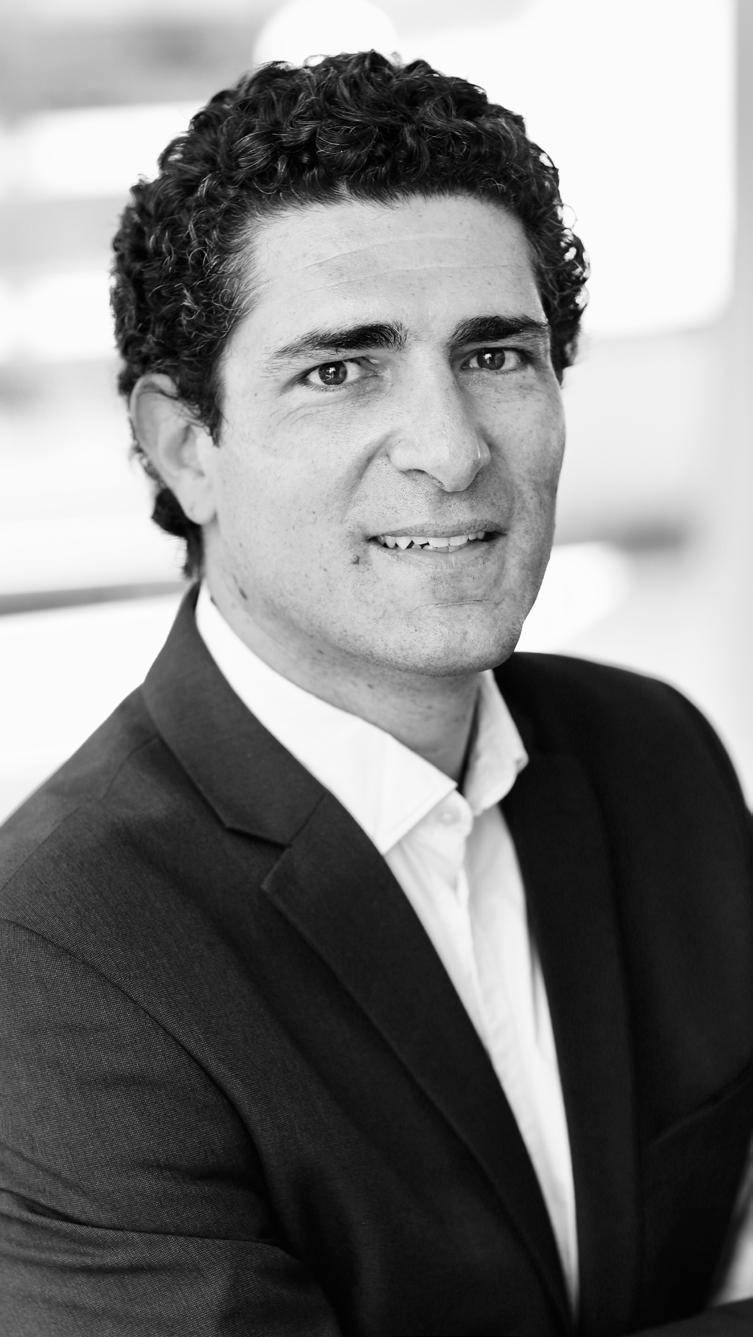
The Institute 3IA Côte d’Azur, launched in September 2019 and coordinated by Universitè Côte d’Azur, is dedicated to the applications of Artificial intelligence (AI) to health and for smart territories. This first period of four years allowed to install a great dynamic around AI on Côte d’Azur, and the Institute is now positioning itself as an asset for its ecosystem in which it plays a driving role, bringing together business, research and training institutes and public players.
The 3IA Côte d’Azur is one of the 4 Interdisciplinary Institutes of Artificial Intelligence labelled in France in April 2019. The institute is run by six key academic actors of AI in the region: Universitè Côte d’Azur, CNRS, Inria, Inserm, Eurecom and Skema. The project is also supported by Mines ParisTech, Nice University Hospital, INRAE, local authorities and more than 100 companies and startups. The institute has beneficiated from a total budget of more than 50 million euros for the period 2019-2023.
These last two years (2021-2023) of exercise of the Institute have been crowned with great achievements in research (more than 950 scientific publications), in innovation (more than 10 millions Euros invested by local companies in research collaborations) and education (+50% of people trained in AI, with the launch of new initial and continuing training programs, and the obtention of the EFELIA grant for more than 8M€).
This second activity report provides a further update on the Institute’s progress in research, innovation and training. The report also highlights the extent to which the institute has established itself as a center of excellence in AI, with an ever-growing international profile. This positions us very well to attract tomorrow’s AI talent to our region, whether in research, engineering or R&D, and augurs well for the Institute’s new season, which is due to open very soon.
Prof. Charles Bouveyron Director of 3IA Côte d’Azur


The 3IA Côte d’Azur is one of four “Interdisciplinary Institutes for Artificial Intelligence” (3IA) accredited in France in 2019. It focuses on health and smart territories . Its mission is to foster an innovative and influential ecosystem at the local, national, and international levels. The institute is coordinated by Universitè Côte d’Azur in collaboration with leading academic and research institutions in the region: CNRS, EURECOM, Inria, Inserm, and SKEMA Business School . It is part of the national 3IA network, which includes 3IA Côte d’Azur, ANITI Toulouse, MIAI Grenoble, and PRAIRIE Paris.
In 2022, Université Côte d’Azur secured €8 million in funding for the French School of Artificial Intelligence (EFELIA) project . Operated locally by the 3IA Côte d’Azur Institute in coordination with the 3IA network, this initiative aims to establish a national school of AI to scale up training at all levels—both for specialists and interdisciplinary professionals.
The 3IA Côte d’Azur Institute conducts cutting-edge research supported by strong talent teams: 41 3IA academic chairs, 3 international chairs, and 98 Ph.D students and postdoctoral researchers . By the end of 2023, its 108 industry collaboration contracts represented €16.3 M of financial investments from companies. With its certified 3IA academic programs, the Institute has doubled the number of individuals trained in artificial inte lligence within its ecosystem.

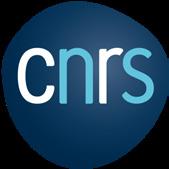



The overall objective of the 3IA Côte d’Azur is to advance artificial intelligence applications that address real-world challenges, particularly in healthcare and smart territorial development. The Institute’s research is organized around four main axes:
1. Core elements of AI
2. AI for integrative computational medicine
3. AI for computational biology and bio-inspired AI
4. AI for smart and secure territories
The overall budget of the Institute was about €50M over 4 years, including €16M from the French State in the framework of the French Investment for the Future Programme (PIA).


› Make AI expertise, algorithms and tools available to academia, companies, and the community, in order to have a significant impact in terms of economic value but also in the everyday life of the citizens.
› Create an innovative ecosystem that is influential at the local, national and international levels, and a focal point of excellence for research and education.
For the period 2019-2023, the Institute has built a comprehensive strategy in research and training around its four thematic axes. It has also developed strong partnerships with the local industrial ecosystem and at the international level. To maintain and amplify this momentum, the Institute has successfully applied the “IA Cluster: World-class research and training centers in artificial intelligence” call for applications, which is part of the French national strategy in Artificial Intelligence. In the framework of the IA Cluster project, 3IA Côte d’Azur plans to strengthen its actions in research and training over the period 2024-2030 with various international actors, notably based in Europe within the framework of the “Ulysseus” European Universities alliance, as well as in Canada, Japan, Brazil, the United States, and Ind ia.
Following this call for applications, 3IA Côte d’Azur is one of 9 French clusters to be awarded the “IA Cluster” label, with the award of a €20 million grant f rom France 2030.

Furthermore, based in the largest Technopole in Europe and in an attractive region, the 3IA Côte d’Azur Institute benefits from the support of a dynamic industrial ecosystem in AI, which attracts new companies every year. Indeed, regional companies actively support this second phase of the project, called “3IA Côte d’Azur 2030”.
For this 2nd phase, 3IA Côte d’Azur will welcome two new members to its consortium: È cole de l’air et de l’espace et Centrale Mèditerranèe.


At the national level, the net work o f 3IA Institutes plays a central role in the French national AI policy “AI for Humanity’’, launched in the Fall 2018 by President Macron. After a first year during which the Institutes built their own local models, the network of 3IA Institutes was really activated in 2020 with the first joint actions.
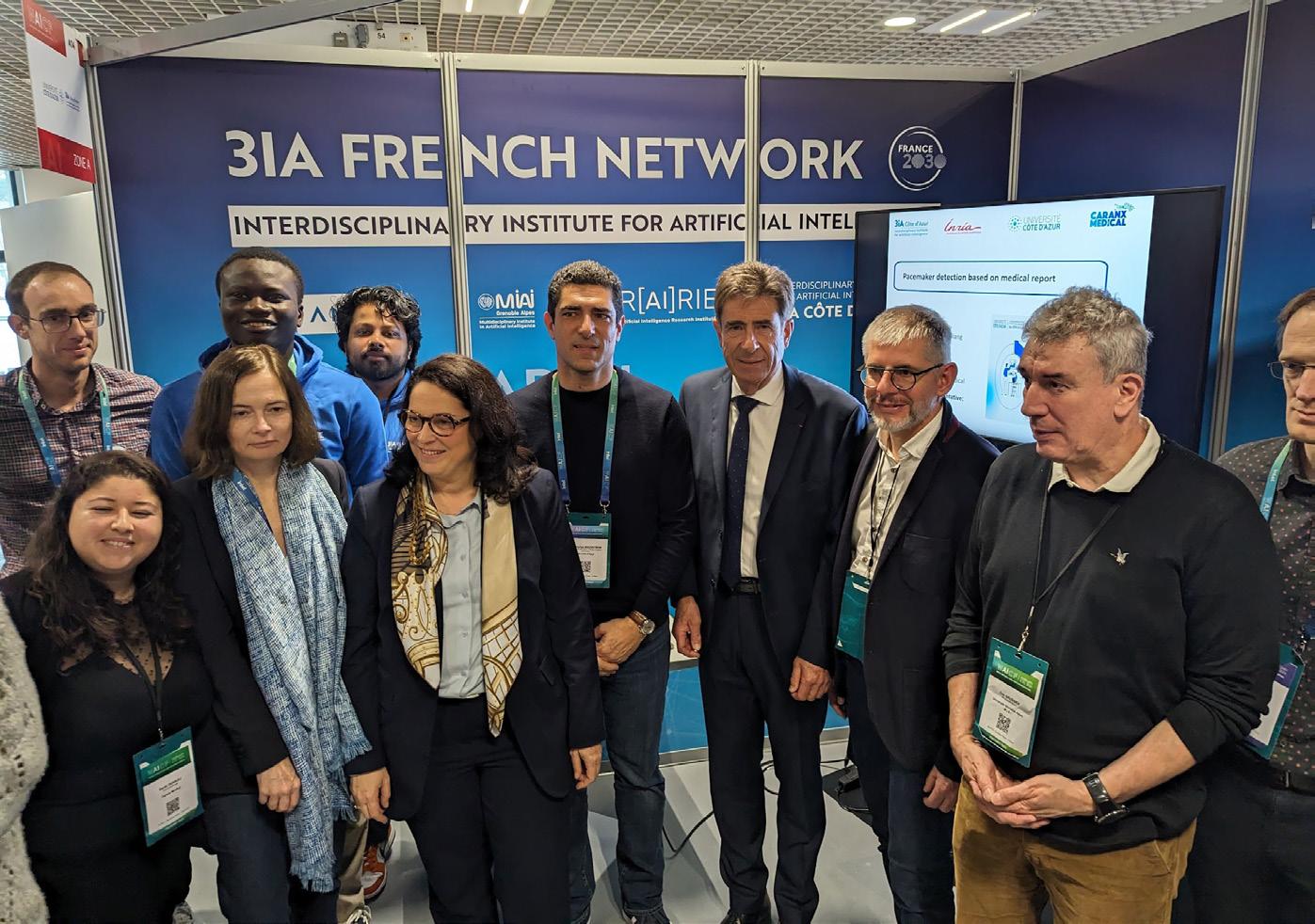
Visit of the French Secretary of State for Digital Affairs, Marina Ferrari, on the booth of the 3IA network, including PRAIRIE, MIAI, ANITI, and 3IA Côte d’Azur, during the WAICF (World AI Cannes Festival) in February 2024.
The network of 3IA Institutes organized several events such as various editions of the “AI4Health”winter school , a “Diversity” day , and a round table “Towards an egalitarian AI?” . These actions are the result of a strong coordination between the 3IA Institutes MIAI, PRAIRIE and 3IA Côte d’Azur on the topic of Health , in collaboration with the French “Health Data Hub’’ initiative .
With the support of INRIA, which coordinates the national research program, the network of 3IA Institutes has reached cruising speed with regular meetings of the management teams, common working groups (education, medical imaging, etc.), an effective website to work and communicate and regular joint events, such as the colloquium for Ph.D. students of the four 3IA Institutes .

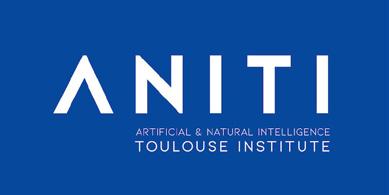
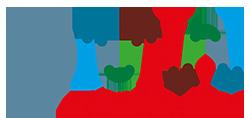
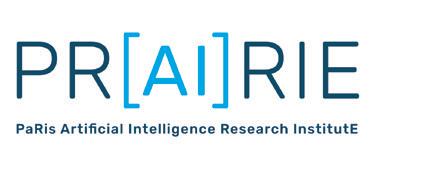


Based within Sophia Antipolis, the Europe’s leading technology park, the Institute’s actions are coordinated with its partners (academics, local authorities, companies, competitiveness clusters, technology transfer subsidiaries) and it plays a driving and central role within its ecosystem, strengthening its dynamism and visibility.

The creation of 3IA Côte d’Azur has also led to the creation of new actors linked to AI and digital technology in the region, which the Institute works with very closely. A first example is the “Maison de l’Intelligence Artificielle” (MIA), dedicated to the education of school children, founded by the Alpes-Maritimes Dèpartement, the CASA (Sophia Antipolis Urban Community), the CCI Nice Côte d’Azur (Nice Côte d’Azur Chamber of Commerce and Industry) and Universitè Côte d’Azur.
Finally, the EuropIA association, also created in 2019 at the initiative of the Alpes-Maritimes Department, aims to develop events around AI for the general public.
The creation of the Institute has enabled the local companies working on AI to form networks so as to interact effectively with the Institute on their AI needs and the orientation of their R&D strategies. ICAIR group (the “Industrial Research Council for Artificial Intelligence”) was launched in June 2019 and gathers large French and international groups, such as Accenture, ACRI-ST, AIR FRANCE-KLM, Amadeus, ARM, Hewlett Packard Enterprise, IBM, NXP Semiconductors, Orange, Renault Software Labs, SAP Labs France, STMicroelectronics and Thales Alenia Space
The “Cluster IA”, founded in the Spring 2019 by Docaposte and 3 startups: Synchronext, MyDataModels and 360&1, along with Universitè Côte d’Azur, brings together the SMEs & startups of the AI ecosystem of the Côte d’Azur region.
3IA Côte d’Azur is therefore now establishing itself as a central element in its region and a natural point of contact for all requests relating to AI (R&D partnership, creation of tailor-made training courses to meet the needs of companies, co-organization and participation in events related to AI, etc.). The Institute also contributes to all these associations and groups by the presence of chairholders, Ph.D. students or post-doctoral researchers at various events and actions aimed at companies and young members of the general public.


€ 51 . 5 M: Overall budget of the Institute
€ 19 M funded by the French state through the ANR, including € 3 M following the successfull mid‑term evaluation
€ 16 M from the public partners institutions
6 founding members
PUBLICATIONS
945 scientific references since 2019
RESEARCH
41 3IA chairs
3 international chairs
5 affiliate chairs 10 invited researchers
81 Ph.D. 17 postdocs
Classes:
22 programs with more than 50% AI content
68 courses since 2019, amounting to 4,600 hours
12 new minors opened for the 2023 2024 academic year
3 summer schools
Team:
+80 people in 3 years
81 Ph.D. students teaching 32 hours of AI per semester
3 new teaching engineers + 4 new junior fellows thanks to the EFELIA project
Training:
Long programs for degrees in AI: + 2100 people/year
AI for continuing education in companies: +300 people/year
AI for citizen outreach: +6,800 people/year
EFELIA:
In 2022, the project won an €8M grant as part of the France 2030 program “Skills and Professions of the Future”
PARTNERSHIPS AND INNOVATION
140 companies working with the institute
108 contracts signed
€5,57M of cash income
€16.34M of financial investment from companies
9 patents 14 softwares
10 start ups created by a 3IA chairholder or a member of their team
3IA Techpool
4 engineers to perform sofware developments tasks 16 projects
2 editions of the “3IA research week for companies” 12 companies providing use cases in AI
51 Ph.D. students in AI involved
6 Webinars for companies

2 Talents days / Job dating


The research activity of the Institute is based on the idea that AI operates in the real world , particularly with applications in healthcare (medicine and biology) and smart territories . The scientific program covers four main research areas:
Core elements of AI
AI for integrative computational medicine
AI for computational biology and bio-inspired AI
AI for smart and secure territories
Some representative examples of contributions in core AI with applications on the health and secure territories are:
• Cyber-defense project by Charles Bouveyron – Axis 1 Cyber-defense trough statistical network analysis.
• Fed-BioMed by Marco Lorenzi – Axis 1
An open-source research and development initiative for translating collaborative learning into real-world medical applications, including federated learning a nd federated analytics.
• PEACE by Serena Villata , Elena Cabrio – Axis 1
Providing Explanations and Analysis for Combating Hate Expressions based on a method of not only detecting explicit and implicit hate speech in text, but also explaining these predictions with natural language (using language models such as GPT).
• Dolphin Design ’s industrial chair – Axis 3
An interdisciplinary approach to explore novel adaptive hardware architectures inspired from neurosciences and cognitive sciences for embedded AI applicatio ns.
• SARS-CoV-2 variants sequencing in wastewater by Pascal Barbry – Axis 3
Tracking down the different variants of the SARS-CoV-2 virus in wastewater from the city of Nice, in order to quantify the level of the virus and determine the nature of any variants.
• SequoIA analytics by Cèdric Richard – Axis 4
An AI-powered toolkit for real-time urban road monitoring, integrating traffic flow and geotechnical analysis.
• Digital twins of construction sites by Pierre Alliez – Axis 4
New learnable 3D shape representations, combining geometric processing and machine learning for data-driven modeling applications.
In the following, we will summarize the research program of the Institute as well as the main obtained results.


The institute has counted up to 49 Chairs (including 3 international chairs and 5 affiliate chairs) in 4 strategic scientific areas:
• Axis 1: Core elements of AI
• Axis 2: AI for integrative computational medicine
• Axis 3: AI for computational biology and bio-inspired AI
• Axis 4: AI for smart and secure territories
The institute’s journey started its activity in September 2019, marked by the selection of 27 3IA Chairs and 3 international chairs by an esteemed international jury. Since then, the initiative has continued to grow and evolve, reinforcing its strategic research axes. In 2022, the recruitment of Vincent Vandewalle as a 3IA Chair brought new momentum to Axis 1, through his research on “Finding structures in heterogeneous data.” That same year, a new affiliate chair was established under Axis 2, led by Pierre Berthet-Rayne from Caranx Medical, focusing on the theme “AI for Autonomous Surgical Robots” in close collaboration with Nicholas Ayache. Additionally, Universitè Côte d’Azur welcomed two Junior Professor Chairs in “AI and Economics” and “AI and Archaeology”.
The Scientific Committee of 3IA evaluates (3 calls per year) the applications to the recruitment of the Ph.D. students and post-docs of the institute. Thus, 81 Ph.D. students and 17 postdoctoral researchers have been recruited . Ph.D. students and post-docs play a major role in the research and dynamics of the Institute.
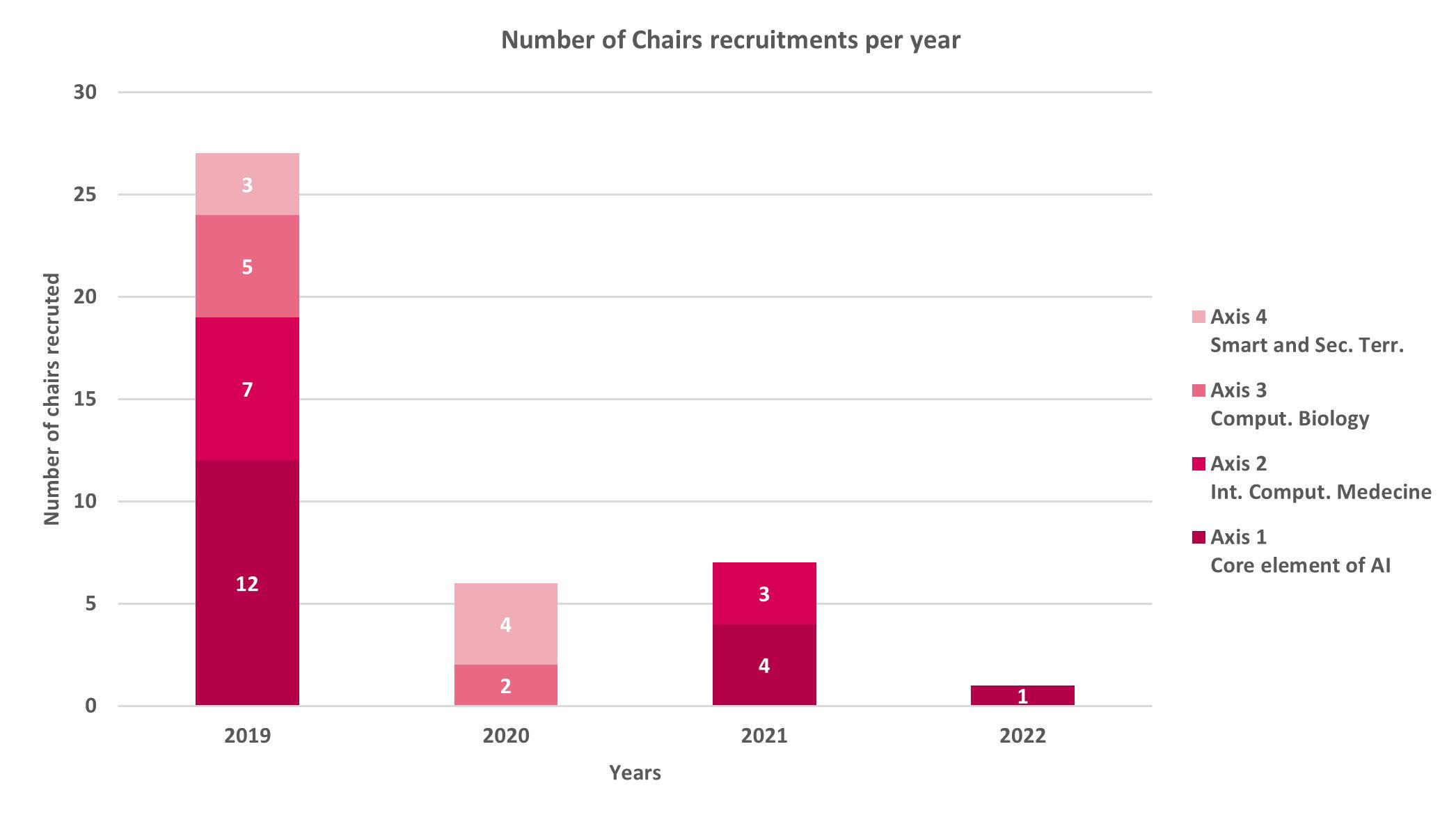


In addition, the Institute is developing a program of visiting researchers to strengthen its attractiveness and its international links. Nine researchers benefited from the ‘Visiting Scholars’ program, allowing them to spend at least one month in the laboratories of the consortium members:
• Bersini Hugues (Universitè Libre de Bruxelles, Belgium)
• Ciortea Andrea (University of St. Gallen, Switzerland)
• Dutta Kunal (University of Warsaw, Poland)
• Ekenel Hazim Kemal (Istanbul Technical University, Turkey)
• Lauriére Mathieu (NYU Shanghai, China)
• Lejemble Thibault (EPITA, France)
• Navarin Nicolo (University of Padua, Italy)
• Palmonari Matteo (University of Milano-Bicocca, Italy)
• Raftery Adrian (University of Washington, USA)
First, regarding publications, the dedicated page of the French open science website HAL , shows the number of publications by chairholders in the top-tiered conferences (Neurips, ICML, AISTATS, IJCAI, ECAI, AAAI, CVPR, ICCV, and MICCAI) and in artificial intelligence journals (Nature journals, Machine Learning, Artificial Intelligence, AI in Medicine, NeuroImage, IEEE PAMI, Annals of Applied Statistics, etc.).



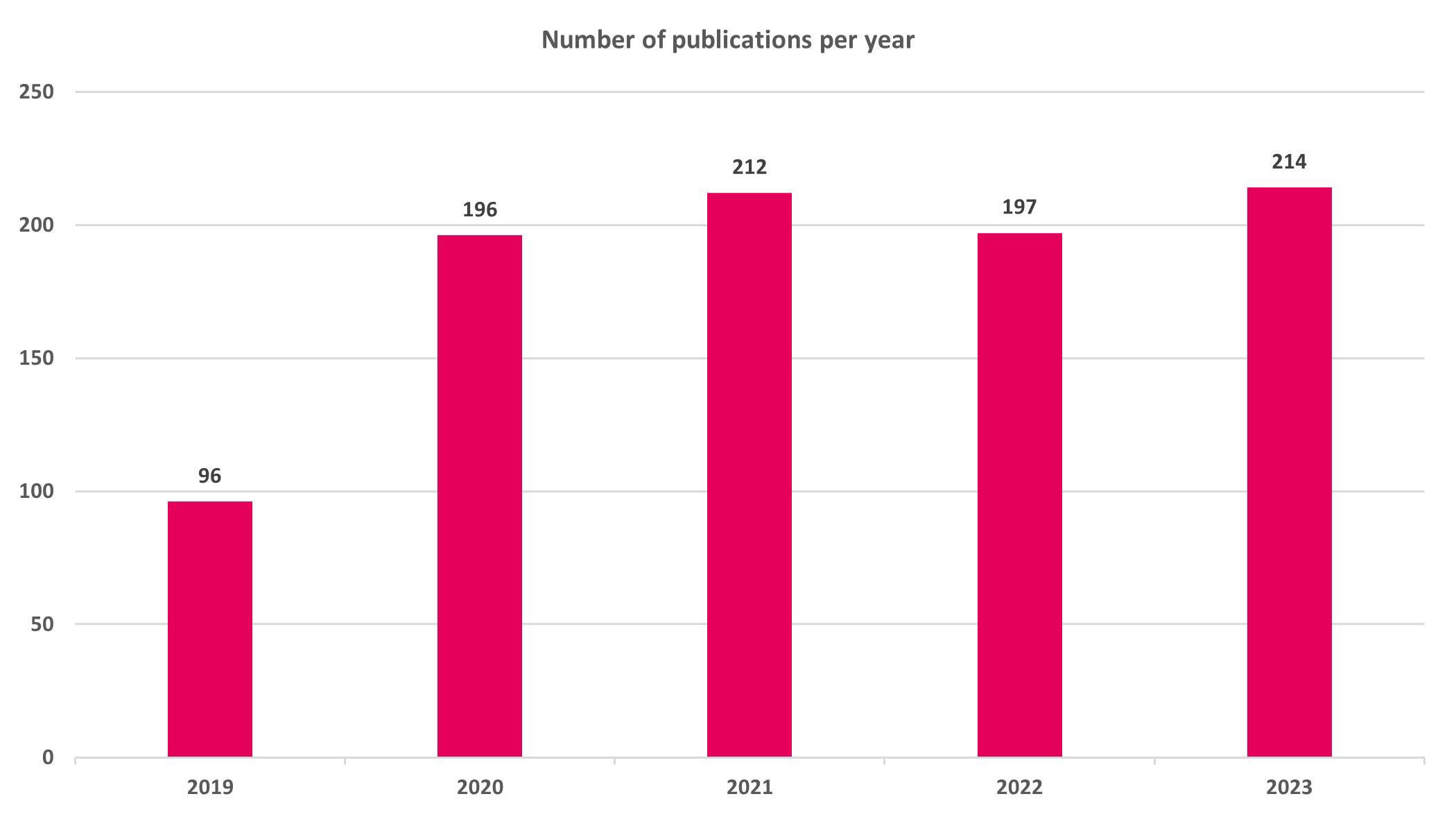
To date, the activity of the Institute’s researchers has produced 945 scientific publications since 2019. These include a large number of interdisciplinary publications, some co-authored with companies (Criteo AI Lab, Frog Labs AI San Francisco, Amadeus, SAS Institute Inc., Toyota Motor Europe, and Dassault Systémes).
The number of publications in AI by researchers who currently hold a chair has significantly increased since the Institute was recognized in 2019, compared to the previous five years. The Institute community has generated 20% more publications per year since its founding and has been able to maintain this momentum during the period from 2021 to 2023. Second, it is important to note that the Institute supported an increasing number of multidisciplinary publications, in particular between health applications of AI a nd smart territories.


The following five representative publications have been selecte d from each project partner.

• L. Ohl, P.-A. Mattei, C. Bouveyron, W. Harchaoui, M. Leclercq, A. Droit, F. Precioso Generalised Mutual Information for Discriminative Clustering. N eurIPS 2022
• Bonlarron, A. Calabrèse, P. Kornprobst, J.-C. Règin. Constraints First: A New MDD-based Model to Generate Sentences Under Constraints. IJCAI 2023
• G. Ciravegna, P. Barbiero, F. Giannini, M. Gori, P. Liò, M. Maggini, S. Melacci. Logic Explained Networks. Artif. Intell. 314: 103822 2023
• Q. Huy Tran, H. Janati, N. Courty, R. Flamary, I. Redko, P. Demetci, R. Singh. Unbalanced COoptimal Transport. AAAI 2023
• A. Sportisse, O. Humbert, C. Bouveyron, P.-A. Mattei. Are labels informative in semi-supervised learning ? Estimating and leveraging the missing-data mechanism. ICML 2023


• M. Sermesant, H. Delingette, H. Cochet, P. Jaïs, N. Ayache. Applications of artificial intelligence in cardiovascular imagin g. Nature Reviews Cardiology, 2021, 18, pp.600-609
• H. Chen, Y. Wang, B. Lagadec, A. Dantcheva, F. Brèmond. Learning Invariance From Generated Variance for Unsupervised Pe rson Re-Identification. IEEE Trans. Pattern Anal. Mach. Intell. 45(6): 7494-7508 2023
• O. Marfoq, G. Neglia, R. Vidal, L. Kameni. Personalized Federated Learning through Local Memorization. ICM L 2022
• Y. Fraboni, R. Vidal, L. Kameni, M. Lorenzi. A General Theory for Federated Optimization with Asynchronous a nd Heterogeneous Clients Updates. JMLR. 24: 110:1-110:43 2023
• R. Fu, C. Wen, Q. Li, X. Xiao, P. Alliez. BPNet: Bèzier Primitive Segmentation on 3D Point Clouds. IJCAI 2023: 754-762
• J. Aubert, L. Lehèricy, P. Reynaud-Bouret. On the convergence of the MLE as an estimator of the learning r ate in the Exp3 algorithm. ICML 2023
• Pascal Barbry et al. Monitoring SARS–CoV–2 variants alterations in Nice neighborhood s by wastewater nanopore sequencing. The Lancet Regional Health – Europe, 2021, 10
• V. Stergiopoulou, L. Calatroni, S. Schaub, L. Blanc–Feraud. 3D Image super–resolution by fluorophore fluctuations and MA–TIRF microscopy reconstruction (3D–COL0RME). ISBI 2022 – IEEE 19th Internationa l Symposium on Biomedical Imaging
• T. Mayer, S. Marro, E. Cabrio, S. Villata. Enhancing Evidence–Based Medicine with Natural Language Argumen tative Analysis of Clinical Trials. Artif. Intel. in Medicine, 2021, pp.102098
• P. Goffredo, S. Haddadan, V. Vorakitphan, E. Cabrio, S. Villata. Fallacious Argument Classification in Political Debates. IJCAI, Jul. 2022, Vienna, Austria. pp.4143–4149
• Z. Becvar, D. Gesbert, P. Mach, M. Najla. Machine Learning-Based Channel Quality Prediction in 6G Mobile Networks. IEEE Commun. Mag. 61(7): 106-112 (2023)
• V. Ngoc Dang, F. Galati, R. Cortese, G. Di Giacomo, V. Marconetto, P. Mathur, K. Lekadir, M. Lorenzi, F. Prados, M. A. Zuluaga. Vessel-CAPTCHA: An efficient learning framework for vessel annot ation and segmentation. Medical Image Anal. 75: 102263 (2022)
• B. Tran, B. Shahbaba, S. Mandt, M. Filippone. Fully Bayesian Autoencoders with Latent Sparse Gaussian Process es. ICML (2023)
• M. Mansouri, M. Önen, W. Ben Jaballah. Learning from Failures: Secure and Fault-Tolerant Aggregation f or Federated Learning. ACSAC 2022
• K. Muandet, M. Kanagawa, S. Saengkyongam, Sanparith Marukatat. Counterfactual Mean Embeddings. J. Mach. Learn. Res. 22: 162:1- 162:71 (2021)


Inserm
• G. Efthymiou, L. Blanc-Fèraud, E. van Obberghen-Schilling et al. Fibronectin Extra Domains tune cellular responses and confer to pographically distinct features to fibril networks. Journal of Cell Science (2021)
Skema
• M. Di Russo, Z. Babutsidze, C. da Costa Pereira, M. Iacopetta, A. G. B. Tettamanzi. Agent–Based Modeling for Studying the Spontaneous Emergence of Money. 21st IEEE/ WIC/ACM Int. Conf. on Web Intelligence and Agent Technologies
• Dwivedi, Y., Kshetri, N., Hughes, L., Slade, E. L., Kar, A. K., Jeyaraj, A., Pagani, M. (2023) . So what if ChatGPT wrote it? Multidisciplinary perspectives on opportunities, challenges and implications of generative conversational AI for research, practice and policy.
International Journal of Information Management, 71, pp. 102642
• Y. Wind, W., Pandya, M., Pagani M. and Dischler J. (2023).
3 Visions of the Future of AI for Customer Engagement: 2027 Sce narios. Manag. and Busin. Review, 3(1&2), pp. 159-164
• Pagani M. and Champion, R. (2020).
Making Sense of the AI Landscape. Harvard Business Review
• D. Allemang, J. Hendler, and F. Gandon. Semantic Web for the Working Ontologist. ACM (2020)
• Betti and M. Gori, Deep Learning to See: Towards New Foundations of Computer Vision, Springer (2021)
• X. Pennec, S. Sommer, and T. Fletcher. Riemannian Geometric Statistics in Medical Image Analysis. Elsevier (2020)



The chairholders of the Institute and their teams have received several national and international awards, and recognition certifying the excellence of their research achievements. In particular, we highlight the following:
Scientific awards and distinctions*:
• Laure Blanc-Fèraud : Mèdaille d’Argent du CNRS (2023)
• Patricia Reynaud-Bouret : Ordre national du mèrite (2023)
• Serena Villata : Junior Researcher Award Inria of the French Academy of Scienc es (2021)
Other distinction of 3IA Chairs:
• Pierre Alliez : SOCG 2023 Test of time Award
• Nicholas Ayache : International Steven Hoogendijk Award (2020)
• Hervè Delingette: Prix de l’Innovation Acadèmie des Sciences Inria-Dassault Systémes (2023)
• Maurizio Filippone : AXA Chair of Computational Statistics (2016-2023)
• David Gesbert : Research grand prize of IMT–French Academy of Sciences, MinesTèlècom (2021)
• Sèbastien Ourselin : Fellow of the Royal Academy of Engineering FREng (2021), Fellow of the Institute of Physics and Engineering in Medicine FIPEM (202 3)
• Maxime Sermesant : Prix de l’Innovation Acadèmie des Sciences Inria-Dassault Systémes (2023)
• Juliette Raffort-Lareyre : Horizon Commission europèenne “Developing trustworthy Artificial Intelligence-driven tools to predict vascular disease risk and progression: VASCUL-AID”(2022)
Other distinctions of Ph.D. students or postdoc researchers:
• Rèmi Fèlin : ESWC 2023 Exaequo best research paper award, PFIA/IC 2023 Prix de l’article mis en lumiére
*as referred to in Article 48 of Decree No. 2014-997 of September 2, 2014.


Several international scientific events have been organized by the chairholders. Among others:
• An international workshop at NeurIPS, 2021, on “Optimal Transport for Machine Learning” ( Rèmi Flamary )
• The special session on “Security and Fairness in Collaborative Healthcare Data Analysis” at ISBI, 2021 ( Marco Lorenzi )
• The Workshop on Disease Progression Modelling at MICCAI, 2021 ( Marco Lorenzi )
• The Workshops Track of ACL, 2022 ( Elena Cabrio )
• The IEEE ISBI conference, 2021 ( Laure Blanc-Fèraud )
• 6G Wireless foundations forum, 2021 ( David Gesbert )
The activity of the chairholders at the international level is highlighted by their involvement in international research projects both as coordinators and as par ticipants. Among others:
• Maurizo Filippone (partner of the EU international training network in Machine Learning for Communication Systems)
• Serena Villata , and Elena Cabrio (principal investigators of the EU CHIST-ERA ANTIDOTE project “Argumentation-driven explainable artificial intelligence for digital medicine”, 20212024)
• Melek Önen (principal investigator of the Papaya European project “Platform for privacy preserving data analytics”)
• Charles Bouveyron , Elena Cabrio , Fabien Gandon , and Serena Villata (3IA members in the EU Project AI4MEDIA, a Center of Excellence delivering next generation AI Research and Training at the service of Media, Society, and Democracy)
• Maxime Sermesant (principal investigator of the EU H2020 Project SimCardioTest)
Two Advanced ERC grants are currently ongoing in the Institute, held by the chairholders Xavier Pennec and Rachid Deriche .


The objective of this axis is to develop fundamental AI models and algorithms for real world problems.
Within this framework, a core topic is Machine Learning (ML) which ranges from statistical learning to deep learning and their theoretical aspects. Different models of supervised and unsupervised learning have been proposed by 3IA Côte d’Azur chairholders, notably for learning from heterogeneous data , for topological data analysis and for Natural Language Processing (NLP) .
Knowledge Representation and Reasoning (KRR) is also well represented in this axis, with approaches aiming at combining machine learning with symbolic methods, knowledge representation and processing on the Web, methods for linking unstructured, structured and semantic data, and finally reasoning on complex heterogeneous dy namic networks.
A section of Axis 1 is dedicated to constraint-based AI , where distributed and federated AI techniques have been proposed in addition to formal methods for reasoning under uncertainty, especially for real-time decision-making in scenarios specific to the other three axes of 3IA.
Finally, the current and crucial problem of developing AI methods that are interpretable and explainable is of fundamental importance in this context, together with the challenges of AI ethics , which is also one of the research topics pursued in this axis .
A total of 20 principal researchers have contributed to Axis 1 :
• 12 chairholders since 2019: Jean-Daniel Boissonnat , Charles Bouveyron , François Delarue , Maurizio Filippone, Rèmi Flamary, Fabien Gandon, Marco Lorenzi, Xavier Pennec, Jean-Charles Règin , Carlos Simpson , Andrea G.B. Tettamanzi , and Serena Villata
• 4 chairholders since 2021: Elena Cabrio , Motonobu Kanagawa , Pierre-Alexandre Mattei , and Giovanni Neglia
• 1 chairholder since 2022: Vincent Vandewalle
• 1 international chairholder since 2019: Marco Gori
• 2 affiliate chairholders: Freddy Limpens , 2020 and Greger Ottosson , 2021


International chairholder - 2019
Marco Gori , University of Siena Learning and reasoning with constraints
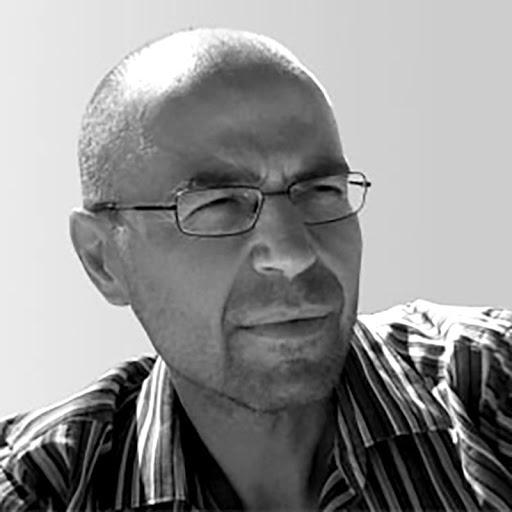
Learning and inference are traditionally regarded as the two opposites, yet complementary and puzzling components of intelligence. In the last few years, Prof. Gori has been carrying out research on constrained based models of the environmental agent interactions, with the main purpose of unifying learning, inference, and reasoning within the same mathematical framework. The unification is based on the abstract notion of constraint, which provides a representation of knowledge granules, gained from the interaction with the environment, as well as of supervised examples. The theory offers a natural bridge between the formalization of knowledge, expressed by logic formalisms, and the inductive acquisition of concepts from data.
Chairholders - 2019
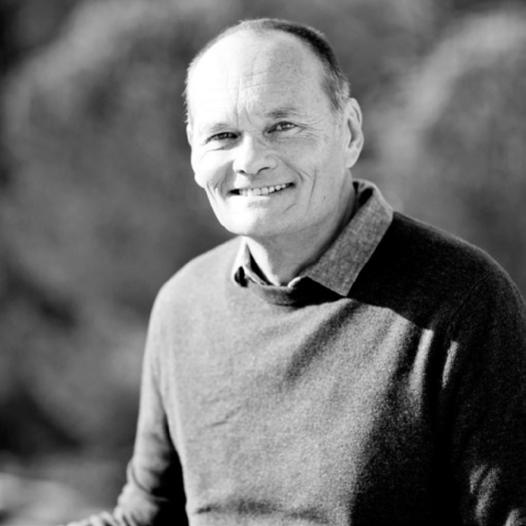
Jean-Daniel Boissonnat , Inria Topological data analysis
We are studying the mathematical, statistical, algorithmic and applied aspects of topological data analysis, a fast-growing field with a well-funded theory that is attracting increasing interest in both fundamental research and in industry. Our ambition is to uncover, understand and exploit the topological and geometric structures underlying complex data.
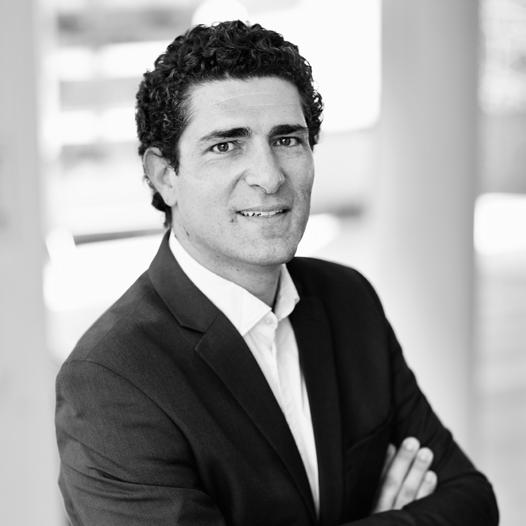
Charles Bouveyron , Universitè Côte d’Azur Generative models for unsupervised and deep learning with complex data
We focus on learning problems that are made difficult by real-world constraints, such as unsupervised deep learning, choosing a deep architecture for a given situation, learning from heterogeneous data or in ultra-high-dimensional scenarios. We seek to develop deep generative models, encoding sparsity priors, to address those issues.


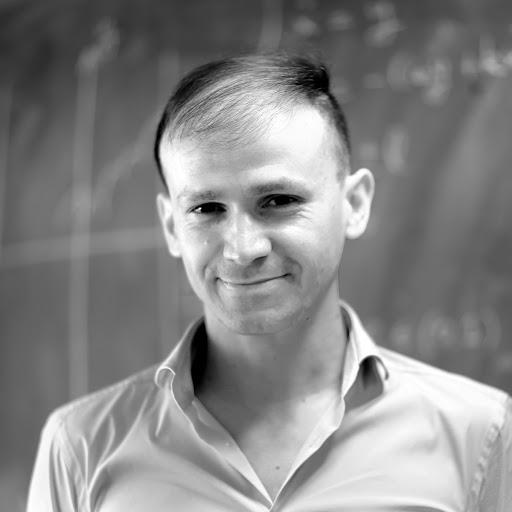
François Delarue , Universitè Côte d’Azur
Mean field multi-agent systems in AI
We study AI systems with a large number of rational agents with mean field interactions. Theoretical questions remain open, specifically when related Nash or Pareto equilibria are not unique, and thus corresponding numerical and learning methods are key issues. Applications include neural networks, power grids, crowd management, cybersecurity, etc.

Maurizio Filippone , Eurecom
Probabilistic machine learning
Probabilistic machine learning offers a principled framework for quantification of uncertainty across various sciences. The Chair will tackle three major modeling and computational issues: (i) The need to develop practical and scalable tools for accurate quantification of uncertainty, (ii) the lack of interpretability, and (iii) the unsustainable trend in energy consumption.
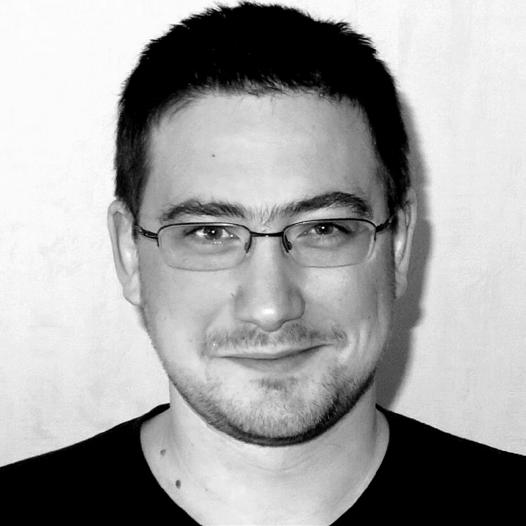
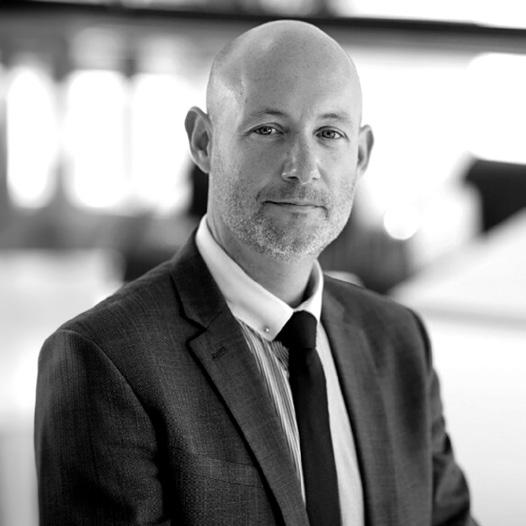

Rèmi Flamary , Universitè Côte d’Azur
Optimal transport for machine learning
The main objective of this project is to change the way we learn from empirical data using optimal transport. We will first investigate optimal transport for transfer learning with biomedical and astronomical applications. Second, we will adapt the GromovWasserstein distance for structured data and transfer between deep learning models with different architectures.
Fabien Gandon , Inria
Combining artificial and augmented intelligence technics on and through the web
Formalizing knowledge-based models and designing algorithms to manage interactions between different forms of artificial intelligence (e.g., rule-based, connectionist, and evolutionary) and natural intelligences (e.g., individual user, and crowd) on the web.





Marco Lorenzi , Inria
Interpretability and security of statistical learning in healthcare
Statistical learning in healthcare must ensure interpretability and compliance with secured data access. To tackle this problem, I will focus on 1) interpretable biomedical data modeling via probabilistic inference of dynamical systems, and 2) variational inference in federated learning for the modeling of multicentric brain imaging and genetics data.
Xavier Pennec , Inria
Geometric statistics and geometric subspace learning
We study the impact of topology (singularities) and geometry (non-linearity) of the data and model spaces on statistical learning, with applications to computational anatomy and the life sciences. The tenet is that geometry is critical when learning with limited resources and real-world constraints such as small data and limited computational resources.
Jean-Charles Règin , Universitè Côte d’Azur Decision intelligence
We are designing explainable decision-making processes satisfying real world constraints in a multi-objective environment including incomplete, fuzzy or stochastic data.
Carlos Simpson , CNRS AI and mathematics
My research addresses the interactions between research areas in algebra, category theory and geometry, and machine learning. This includes applications of AI to the classification of interesting algebraic and geometric structures, and the interactions between AI and formal verification of proofs in both directions.


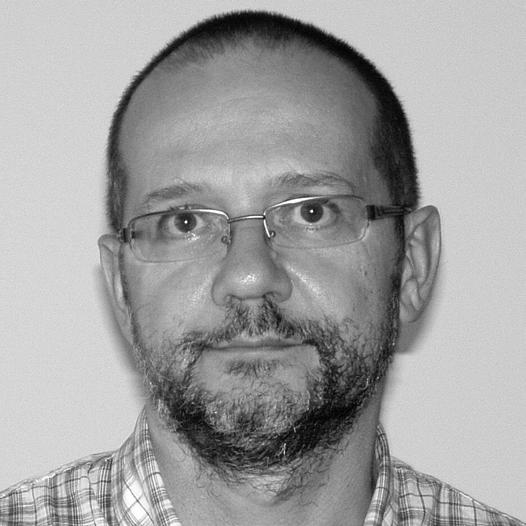

Chairholders - 2021
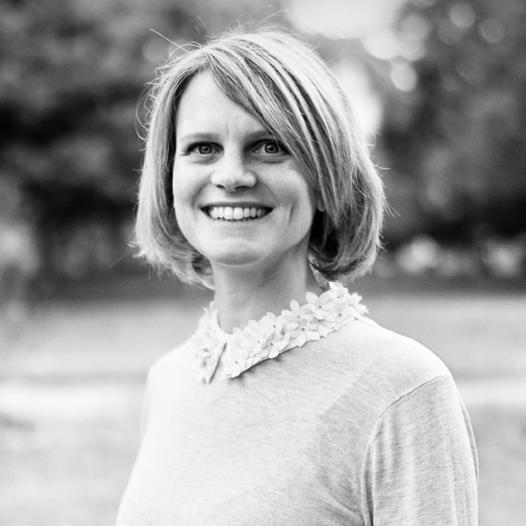
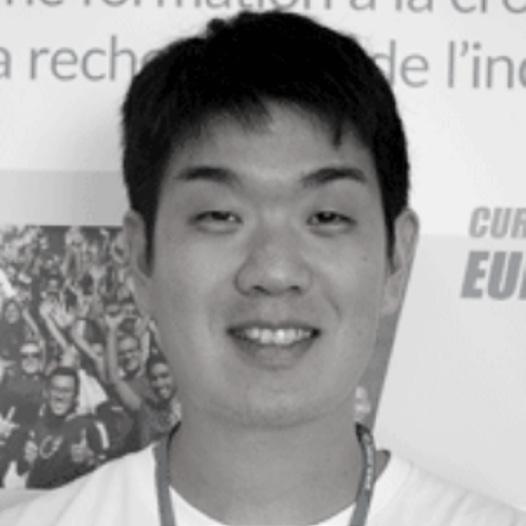
Andrea G.B. Tettamanzi , Universitè Côte d’Azur
Towards an evolutionary epistemology of ontology learning
I am developing symbolic learning methods based on evolutionary computation to overcome the knowledge acquisition bottleneck in knowledge base construction and enrichment. This project, straddling machine learning and knowledge representation and reasoning, combines symbolic aspects of AI with easily parallelizable computational methods.
Serena Villata , CNRS Artificial argumentation for humans
The goal of my research is to design and create intelligent machines with the ability to communicate with, collaborate with, and augment people more effectively. To achieve this challenging goal, intelligent machines need to understand human language, emotions, intentions, behaviors, interact at multiple scales, and be able to explain their decisions.
Elena Cabrio , Universitè Côte d’Azur AI and natural language
The goal of my research is to design debating technologies for advanced decision support systems, to support the exchange of information and opinions in different domains (as healthcare and politics), leveraging interdisciplinarity and advances in machine learning for Natural Language Processing.
Motonobu Kanagawa , Eurecom Machine Learning for Computer Simulation
Computer simulation has been widely used for planning high-impact decision-making (e.g., policies on climate change and Covid-19), but its reliability depends on how accurate simulations can imitate reality. This project develops machine learning methods to improve a simulator’s reliability and the resulting decision-making.


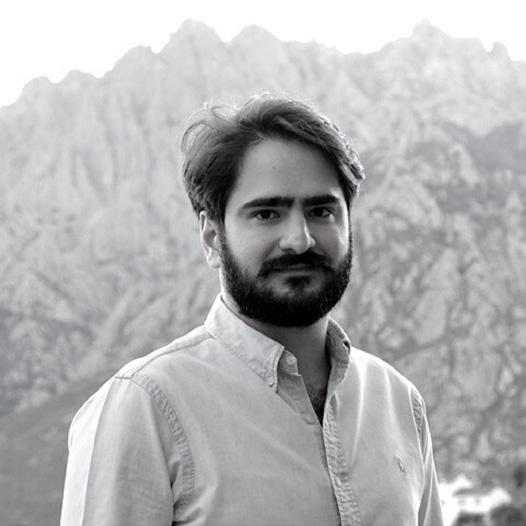
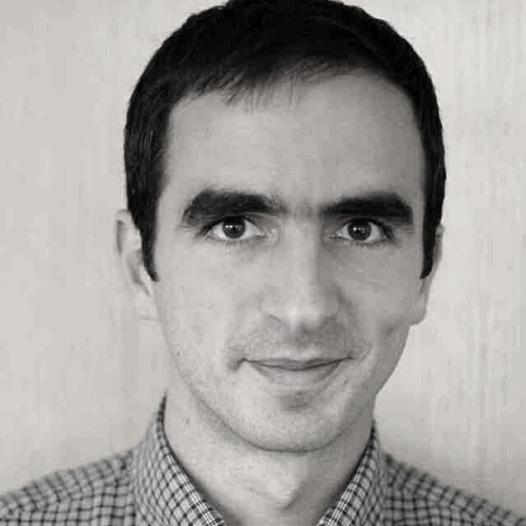
Chairholders - 2022
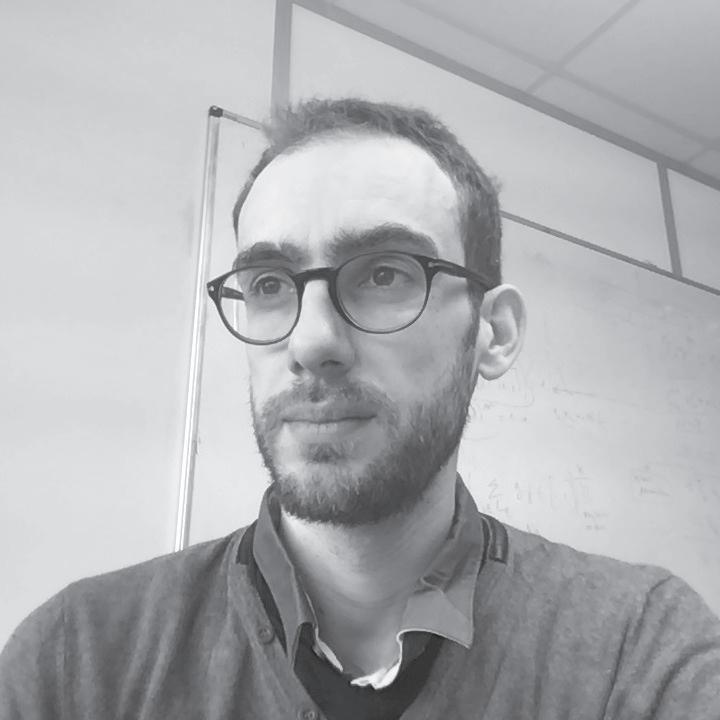
Pierre-Alexandre Mattei , Inria
Deep learning for dirty data: A statistical perspective
The successes of machine learning remain limited to clean and curated data sets. By contrast, real-world data are generally much messier. We work on designing new machine learning models that can deal with “dirty” data sets that may contain missing values, anomalies, or may not be properly normalised. Collaborators include doctors and astronomers.
Giovanni Neglia , Inria Pervasive Sustainable
PERUSALS (Pervasive Sustainable Learning Systems) seeks to identify design principles of Internet-scale distributed learning systems, with a focus on the tradeoff between performance (in particular training and inference times), economic and environmental costs, and privacy.
Vincent Vandewalle , Universitè Côte d’Azur
Finding structures in heterogeneous data
We study heterogeneous data both in their kind and in their distribution. Our ambition is to discover structures in the data that will help the user in understanding it and taking decisions. We focus on designing generative models able to reveal several clustering viewpoints and we will adapt them to the deep-learning setting. We collaborate with doctors and retailers.


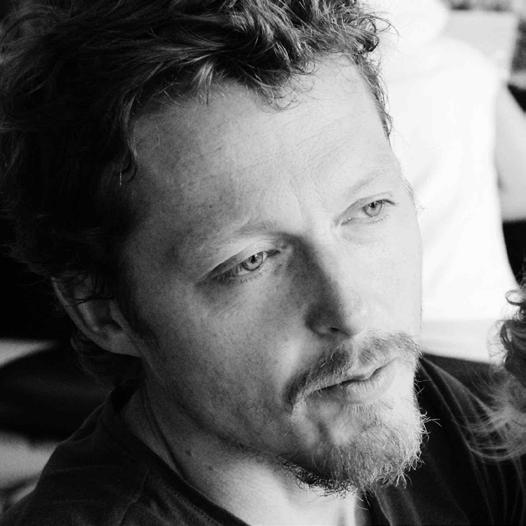
Freddy Limpens , Inria | MNEMOTIX (2020)
Big Knowledge graphs evolution and life cycle
When it comes to deploying big Knowledge Graphs (KG) based information systems in the real world, be it for distributed organisations, small or big companies, some fundamental problems remain unanswered. Our research focuses on solving some of them such as managing the history and evolution of big KG, offering rapid access to KG’s data, automatizing the validation of data, and providing generic templating language for more easily exploiting query results.

As we apply Machine Learning to automate decisions in financial services, healthcare and government, there is increasing user need and regulatory demand for transparency and explainability. Our AI research is focused on explainability for decisions that combine ML-based predictions and rule-based business policies.
Industry
Industrial collaborations with many companies arise in this Axis , in particular:
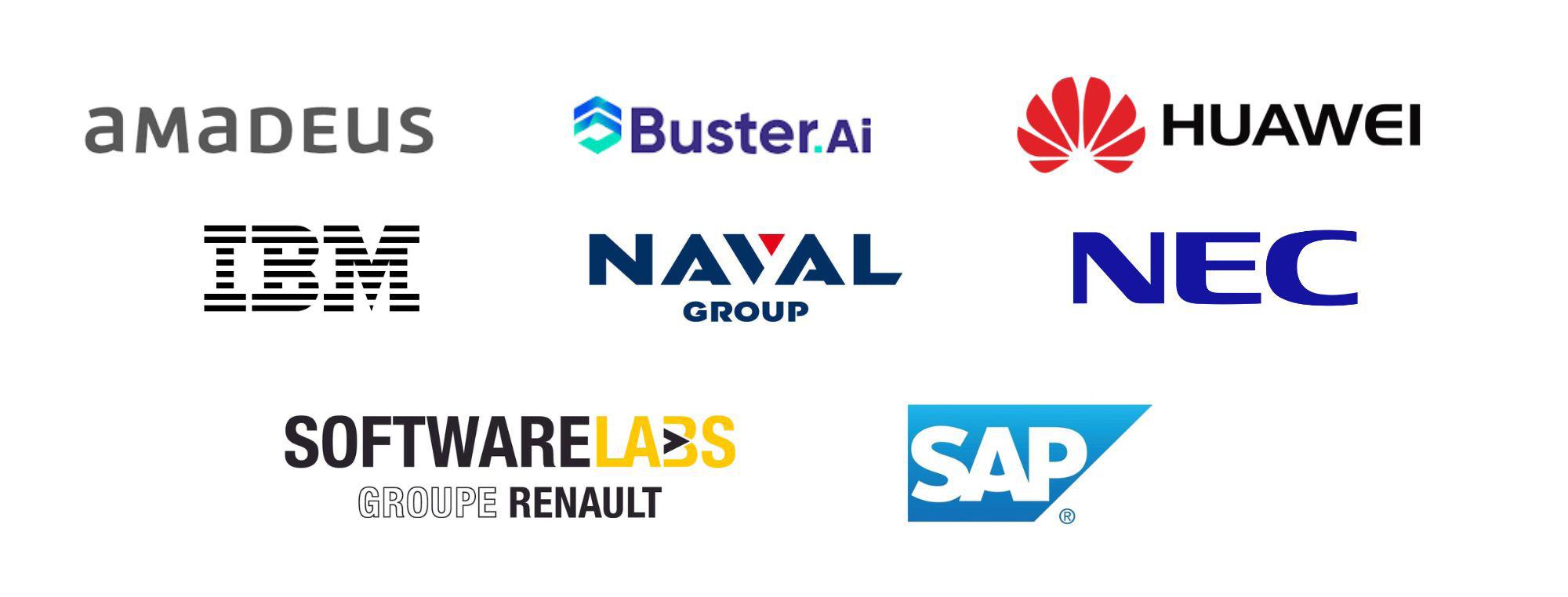


Several multidisciplinary contributions are made in the context of Axis 1 . In particular:

We have also been involved in several activities aiming at investigating the ethical challenges AI algorithms and systems , with the goal to highlight warning points and provide recommendations for ethics-by-design solutions: Serena Villata is member of National Pilot Committee for Digital Ethics.
collaborations
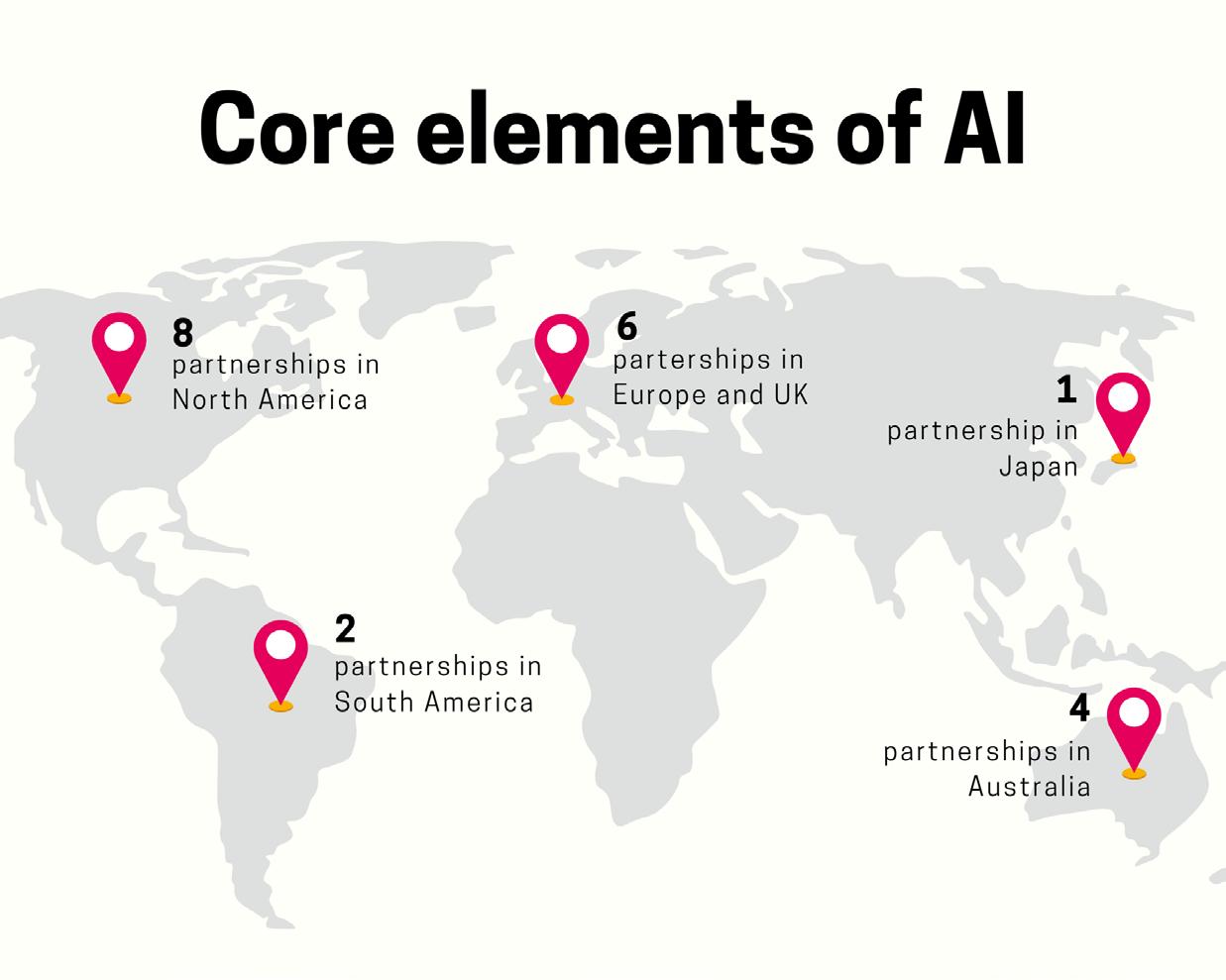


The chairs of Axis 1 are actively involved in a number of international collaborations, which were strengthened over these years. Among others, we highlight the c ollaboration with:
• Columbia University (USA)
• Data61 (Australia)
• Wollongong University (Australia)
• Columbia University Medical Center (USA)
• Austrian Institute for Science and Technology
• University of Sydney (Australia)
• University of Seattle (USA)
• University of Oxford (UK)
• Penn State University (USA)
• University College London (UK)
• Illinois Institute of Technology (USA)
• Leeds University (UK)
• Geneva University Hospitals (Swiss)
• Universitat Pompeu Fabra (Spain)
• Universit é de Louvain-La-Neuve (Belgium)
• Carnegie-Mellon University (USA)
• Universit é de Montr é al (Canada)
• Universit é Laval de Qu é bec (Canada)
• NeuroMat Center of São Paulo (Brazil)
• National Research Institute for Earth Science and Disaster Prevention (Japan)
The chairs of this axis received prestigious awards , i.e.:
• The Artificial Intelligence Journal Classic Paper Award 2022 ( Jean-Charles Règin )
• The French award “Inria – Acadèmie des sciences jeunes chercheurs et jeunes chercheuses” 2021 ( Serena Villata )
They have also been invited to deliver keynote talks in international scientific events , i.e.:
• The 17th Conference of the International Federation of Classification Societies 2022 (Charles Bouveyron )
• 23rd International Conference on Knowledge Engineering and Knowledge Management EKAW 2022 ( Fabien Gandon )
• Recent Advances in Statistical Analysis of Imaging Data of the American Statistical Association 2020 ( Xavier Pennec )
• Partnership for Research and Innovation in the Mediterranean Area PRIMA 2022 ( Serena Villata )
• International Congress of Mathematicians (ICM) 2022 ( François Delarue )
• International Conference on Automated Planning and Scheduling (ICAPS) 2023 ( Serena Villata )
They also coordinated European projects , i.e.:
• EU CHIST-ERA ANTIDOTE project 2019: Argumentation-driven explainable artificial intelligence for digital medicine (coordinators Elena Cabrio and Serena Villata )
• The ERC AdG Grant ELISA 2022: Exploration for Large Interacting Systems of Agents (PI: François Delarue )


This axis aims to generate new fundamental knowledge in medicine to create computational models of the human body and to analyze digital health data in order to improve medical practice in disease prevention, diagnosis, therapy monitoring, and patie nt rehabilitation.
To achieve this purpose, this axis uses data-driven methodological approaches based on machine learning , but also on the integration of mathematical models of human anatomy and physiology . A typical example is the generation of a digital patient which integrates patient data of various natures and at various temporal and spatial scales and analyzes these data to solve a wide range of clinical tasks.
A major issue for this axis is how to manage personal and health data while enforcing data privacy and security requirements . This can be handled both by the development of new technologies (such as federated learning) and by the action of dedicated organizations (hospitals, health data hubs, etc.).
The main clinical applications of this axis are in neurology, neuroimaging, oncology (prostate, lung, thyroid, abdomen, etc.), cardiology, vascular diseases, nuclear medicine, digital pathology , and functional rehabilitation
A total of 14 researchers have contributed to Axis 2 :
• 7 chairholders since 2019 ( Nicholas Ayache , Hervè Delingette , Maxime Sermesant , Rachid Deriche , Jean-Pierre Merlet , Olivier Humbert , and François Bremond )
• 3 chairholders since 2021 ( Vicente Zarzoso , Juliette Raffort-Lareyre , Maria A. Zuluaga )
• 1 International chairholder since 2019 ( Sèbastien Ourselin )
• 2 chairholders are Medical Doctors ( Olivier Humbert since 2019, Juliette Raffort-Lareyre since 2021)
• 1 affiliate chair since 2022 ( Pierre Berthet-Rayne , Caranx Medical)


International chairholder - Since 2019
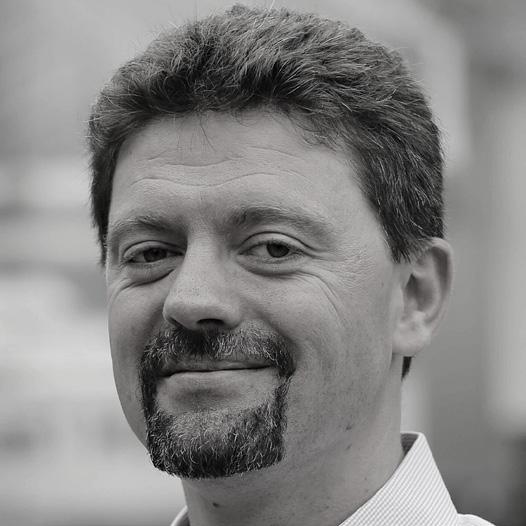
Chairholders - 2019
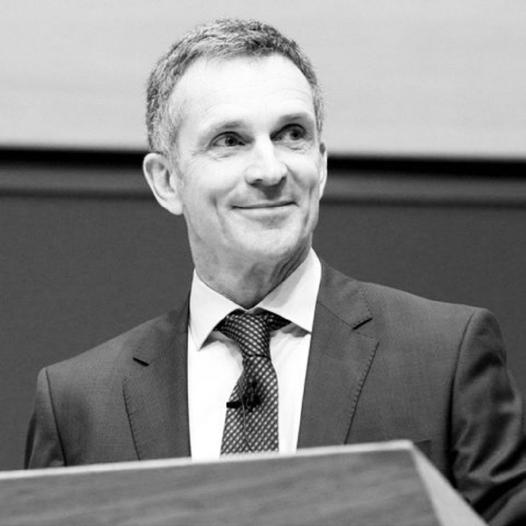
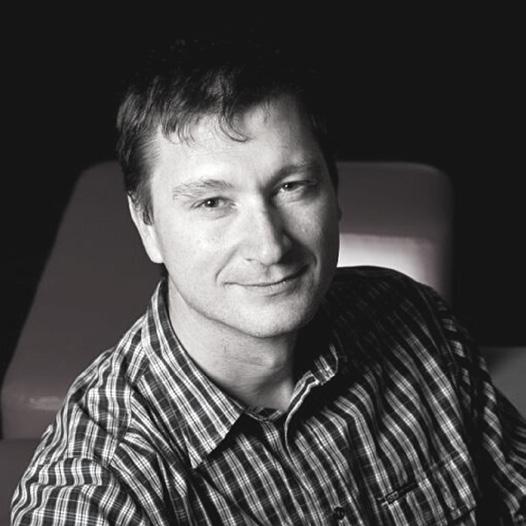
Sèbastien Ourselin , King’s College London AI for Healthcare & Image-guided Interventions
He is Head of School of Biomedical Engineering & Imaging Sciences, Professor at King’s College London and Director of the EPSRC Image-Guided Therapies UK Network+. He published more than 400 articles (h-index: 64). He is associate editor for IEEE Tr. on Med Imaging,J of Med Imaging, Nature Scient. Reports, and Medical Image Analysis.
Nicholas Ayache , Inria AI for e-patients and e-medicine
We are designing and exploiting modern AI methods: (i) To personalize the parameters of advanced models of the e-patient, (ii) to drive e-medicine algorithms on personalized e-patients (i.e. digital twins) for automated diagnosis, prognosis and therapy, in an efficient, robust, safe and explainable manner. We also seek to augment databases with biophysical simulation.
François Brèmond , Inria
Video analytics for human behavior understanding
Video analytics enables us to measure objectively the behavior of humans by recognizing their everyday activities, their emotion, eating habits and lifestyle. Human behavior can be modeled by learning from a large quantity of data from a variety of sensors to improve and optimize, for instance, the quality of life of people suffering from behavior disorders.




Hervè Delingette , Inria
Joint biological and imaging biomarkers in oncology
We exploit joint information from imaging and biological data to improve the diagnosis and treatment planning, focusing on lung cancer. This approach relies on methods involving unsupervised deep learning, uncertainty quantification, sparse Bayesian feature selection and the handling of confounding factors.
Olivier Humbert , Universitè Côte d’Azur
Comprehensive omics profiling for precision medicine in oncology
I am combining various patient extracted “omics” data, including multimodal imaging features, for integrative and data-driven computational medicine. I focus on challenging fields in oncology such as (i) radiogenomics and outcome-focused research in metastatic breast cancer and (ii) the accurate prediction of response to immunotherapy.
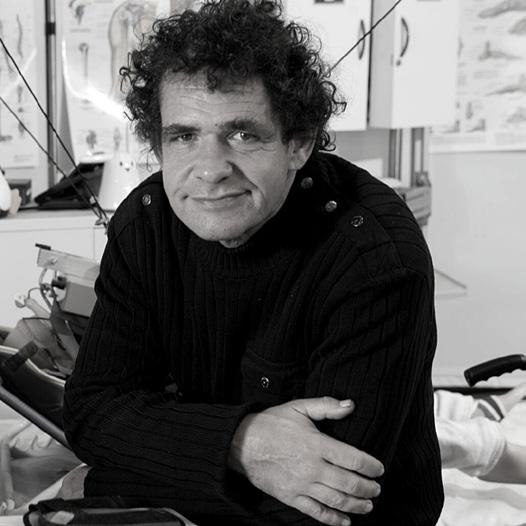
Jean-Pierre Merlet , Inria
Non-invasive assessment of disabilities
We use mathematical/AI methods for (i) designing non-intrusive and affordable monitoring/assistance devices that are adaptable to the user’s/doctor’s needs, (ii) deducing medically pertinent healthindicators from the data, taking into account measurement errors, and (iii) detecting rare events that may be the sign of emerging pathology.
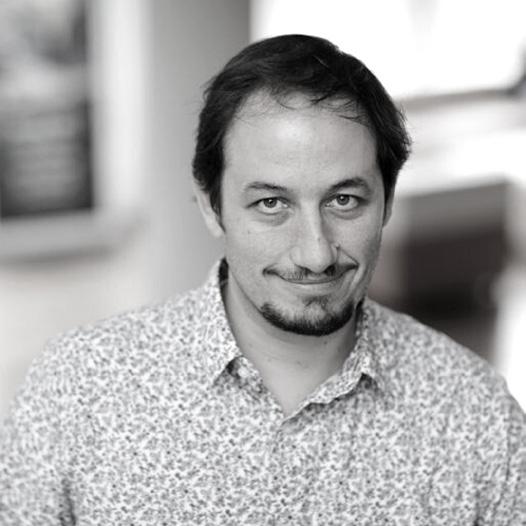
Maxime Sermesant , Inria
AI and biophysical models for computational cardiology
The application of AI in healthcare is challenging due to its lack of robustness and explainability. This project aims to introduce physiological priors in AI through biophysical models. This can be done by reformulating problems through such models, by learning spatiotemporal dynamics from biophysics or by augmenting features and data with such simulations.


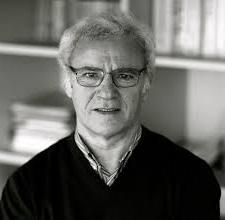
- 2021
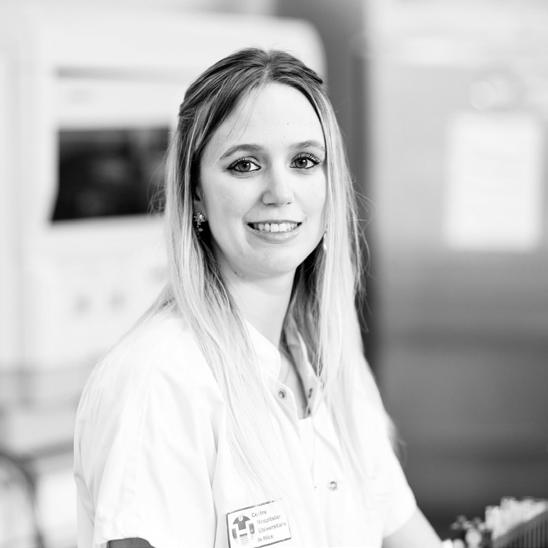
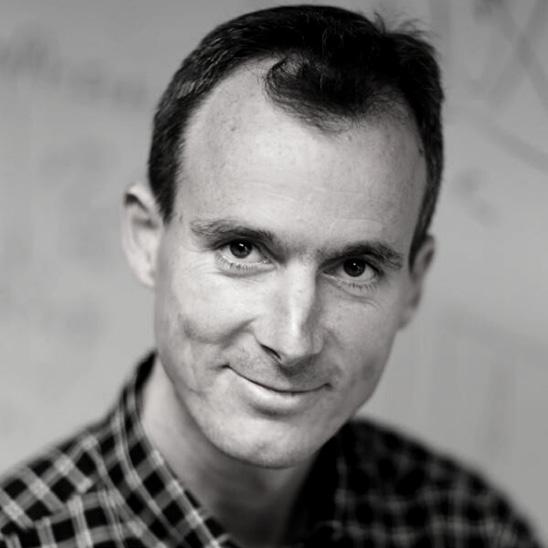
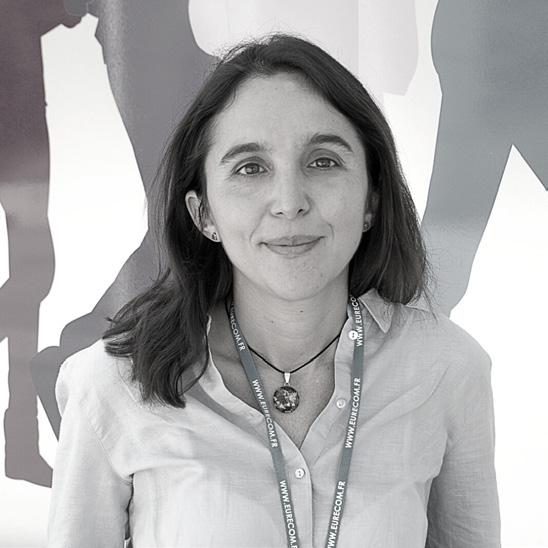

Rachid Deriche , Inria
Computational brain connectomics
This project will reconstruct and analyze the brain’s neural connections network, the connectome, via a computational brain connectomics framework based on ground-breaking AI algorithms and ML tools to gain insight into brain architecture, functioning and neurodegenerative diseases.
Juliette Raffort-Lareyre , CHU Nice / Universitè Côte d’Azur
Applications of AI for patients with vascular diseases
Our team develops AI-derived applications for patients with vascular diseases including aortic aneurysm. We aim to create aid-decision support systems to enhance evidence-based decision and precision medicine through a translational approach including: Identification of biomarkers, automatization of vascular imaging analysis, development of predictive scores using machine learning.
Vicente Zarzoso , Universitè Côte d’Azur
IAblation: Artificial Intelligence for patient-centered atrial fibrillation ablation
Atrial fibrillation is the most common sustained arrhythmia in clinical practice and remains the last great frontier of cardiac electrophysiology. The project aims to put forward new AI techniques to help cardiologists perform more effective patient-tailored catheter ablation procedures to treat this challenging cardiac condition .
Maria A. Zuluaga , Eurecom
Learning-based Models in Medical Imaging: Closing the Gap towards Clinical Translation
We aim to close the gap hindering the translation of AI systems into clinical practice. To this end, we develop novel AI tools for healthcare that 1) learn incrementally as data become available, 2) generalize across multi-modal data and 3) perform quality control of a model and can generate alerts when a decreased in performance is detected.

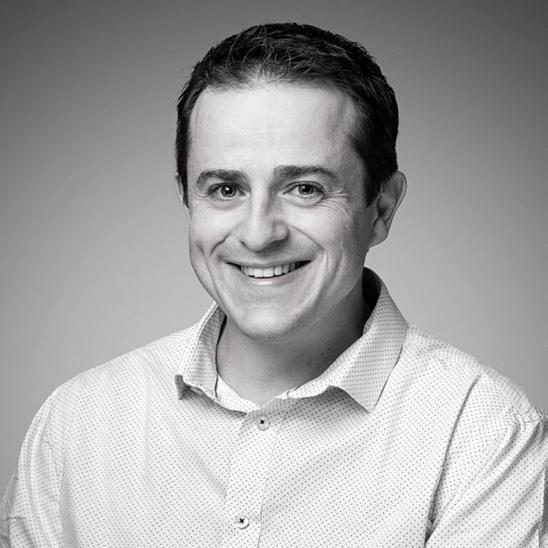
Caranx Medical
Today’s surgical robots are teleoperated mechatronic devices coupled with an imaging system that allow a clinician to perform surgery remotely with improved dexterity, vision, and precision. The future generation of surgical robots will follow the same paradigm as the aeronautics and automotive industries to evolve toward fully autonomous machines. Our ambition is to leverage the latest advances in AI for image processing, context awareness (through sensors and data processing), design, and control to develop a surgical robot that can plan a procedure, interact with clinicians, and perform surgery autonomously under the clinician’s supervision, ultimately providing the best quality of care for all patients.
Industry
Industrial collaborations with many companies arise in this Axis , in particular:

The chairholders of this Axis also contributed to startup creation, i.e., InHeart, Caranx Medical.


Collaborations and networks
Collaborations with medical institutions are raised by the chairs of this Axis :
• Antibes Hospital
• GOSH UK
• Health Data Hub
• IHU Bordeaux
• IHU Strasbourg
• Institut Curie
Academic collaborations , i.e.:
• Institut Gustave Roussy
• Nice University Hospital
• Nice Cancer Hospital (CAL)
• Paris Hospitals
• St Thomas London

The chairholders of this axis received prestigious awards and f ellowships like:
• EURASIP Fellow 2019 ( Rachid Deriche )
• Fellow of the Royal Academy of Engineering 2021 and Fellow de l’Institute of Physics and Engineering 2023 ( Sèbastien Ourselin )
• Steven Hoogendijk Prize 2020 ( Nicholas Ayache )
• Innovation Award of the French Academy of Science 2023 ( Hervè Delingette , Maxime Sermesant )
They also have been invited speakers to main international even ts like:
• Global Congress on AI 2022 ( Nicholas Ayache )
• Abu Dhabi AI Summit 2022 ( Rachid Deriche )
• 36th Annual Congress of European Association of Nuclear Medicine 2023 ( Olivier Humbert )
Moreover, they organized important scientific events like the IEEE International Conference on Image Processing 2021 (General Chair – Francois Bremond ).


Axis 3 aims at quantifying biological structures in space and time from new-generation data at all scales (molecules, cells, tissues, organs) in order to understand and model biological phenomena
Data are heterogeneous, massive, high-dimensional, and embed complex correlations. Novel AI technologies are required to characterize normal and pathological biological functions and to understand the adaptation of organisms to their changing environment (computational biology).
Conversely, insights from cognition offer exciting perspectives to propose new bio - inspired AI algorithms and architectures (bio-inspired AI).
A total of 8 researchers have contributed to Axis 3 :
• 4 chairs since 2019 ( Laure Blanc-Fèraud , Frèdèric Cazals , Patricia Reynaud-Bouret , Ellen Van Obberghen-Schilling )
• 2 chairholders since 2021 ( Pascal Barbry , Benoît Miramond )
• 1 international chairholder since 2019 ( David Wales )
• 1 affiliate chair since 2020 ( David Rouquiè )
International chairholder - Since 2019

David Wales , University of Cambridge Solution landscapes for Machine Learning
We explore machine learning landscapes in the cost function parameter space, which isanalogous to the potential energy surface of a molecule as a function of atomic coordinates. Ongoing advances in methodology developed in chemical physics, can therefore be immediately applied to ML solution landscapes. Our objectives are to use these tools to design improved predictions, and apply them to problems in molecular science and health care. In particular, we seek improved machine learning tools for clinician diagnostic support, to provide earlier detection of the deteriorating (and improving) patient. Specific applications include prediction of readmission to intensive care, which represent a failure in downtransfer to the ward, and are often associated with patient mortality.


Chairholders - 2019
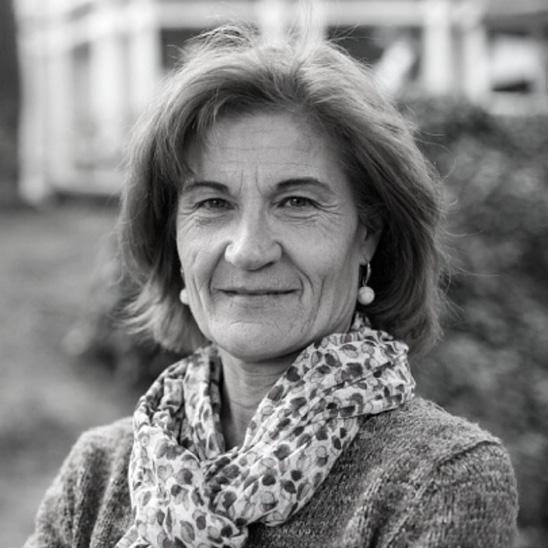
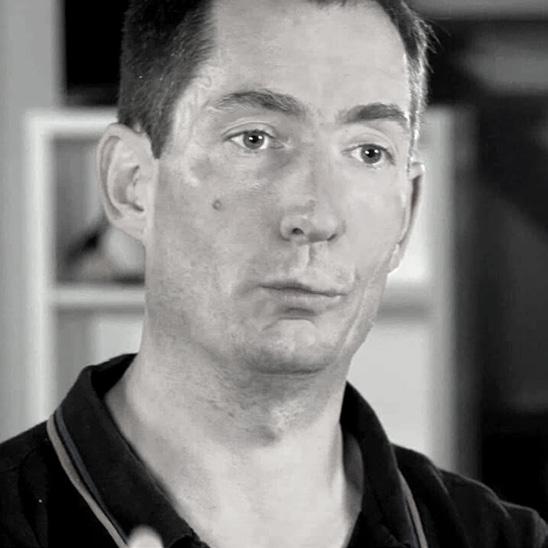
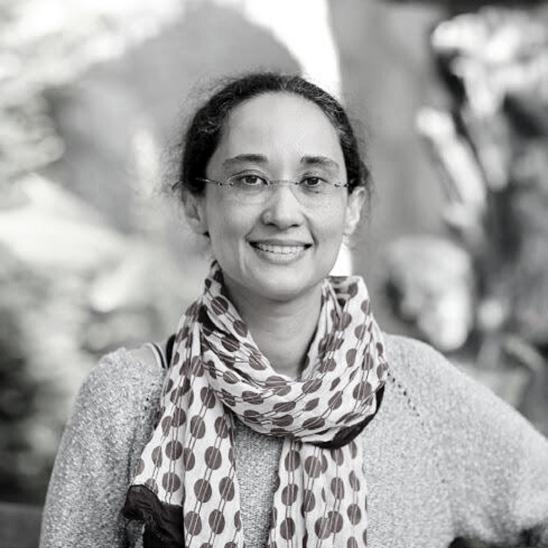
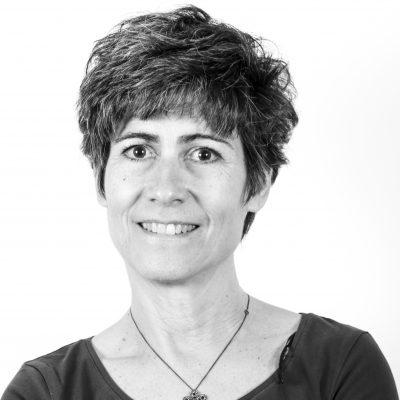
Recent advances in microscope technology provide outstanding images that allow biologists to address fundamental questions. This project aims at developing new AI methods and algorithms for (i) novel acquisition setups for super resolution imaging, and (ii) extraction of valuable quantitative information from these large heterogeneous datasets.
AIMS: Artificial intelligence for molecular studies
By learning essential features of proteins and their complexes, we shall deliver biologically relevant information for large molecular systems on biologically relevant time scales, leveraging our understanding of biological functions at the atomic level, and providing key inputs for protein design and engineering, and protein interaction network s.
Patricia Reynaud-Bouret , CNRS
MEL: Modeling and estimating learning
We are defining new probabilistic models and new estimation methods to understand the deformation of functional connectivity during learning in in vivo experiments.
Ellen Van Obberghen-Schilling , Inserm
AI-powered
Our project will integrate tissue imaging modalities and artificial intelligence-based analysis tools for a deeper understanding and control of cancer, targeting tumor microenvironment and on the role of the extracellular matrix (ECM) in carcinoma progression, spread and response to therapy.


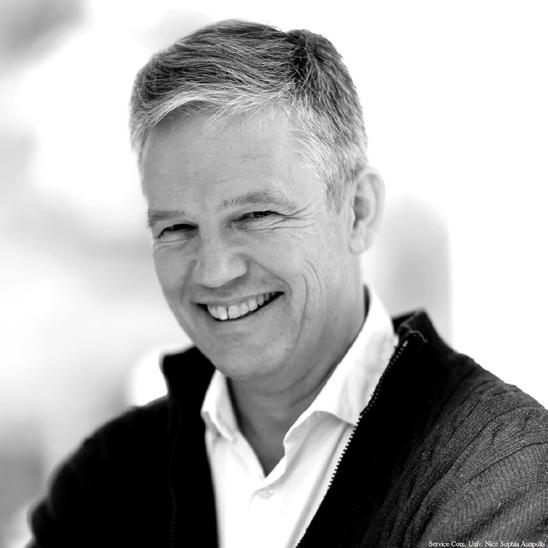
Pascal Barbry , CNRS Human Lung Atlas
The project elaborates on state-of-the-art approaches in genomics and cell biology to describe complex biological samples at the singlecell resolution. Multidimensional biological experiments result in large scale descriptions of DNA, RNA and protein expressions that can be integrated in time and space. The project aims at: (1) Developing novel data-mining approaches based on machine learning and AI; (2) apply them to the study of the normal and pathological lung, in the context of serious threats that touch this organ (COVID-19, asthma, cystic fibrosis, cancer, etc.) .

Benoît Miramond , Universitè Côte d’Azur Bio inspired AI from neurosciences to embedded autonomous devices
The research project seeks to draw on the structure and function of the biological brain to develop more energy-efficient AI methods and algorithms.
The scientific approach ranges from neural dynamics to the emerging cognitive properties of these networks and ultimately to the design of embedded neuromorphic electronic circuits. The project will focus on building bridges between the NeuroMod neuroscience institute and the 3IA Cote d’Azur institute.


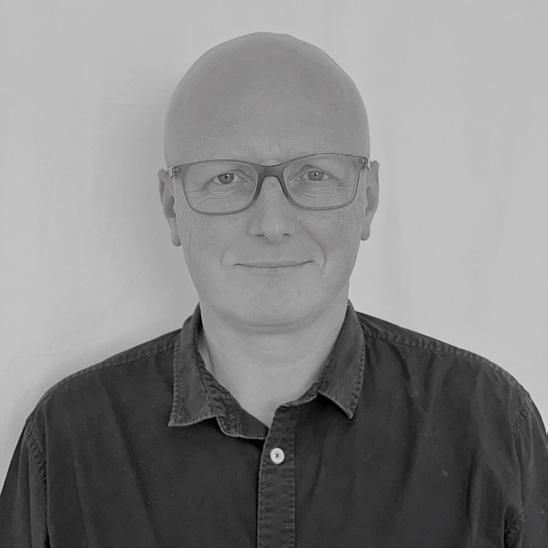
David Rouquiè , Universitè Côte d’Azur | BAYER Human health chemical risk assessments
The main focus of my research activity as affiliate chair at 3IA Côte d’Azur is on the emerging theme of chemical safety by design. This theme derives from all the on-going initiatives to improve the characterization of the risk of chemicals to humans by using more data from non-animal technologies and goes far beyond. Indeed, we are living a paradigm shift in the way bioactive small molecules are discovered but also de-risked. Instead of relying on numerous, long, costly cycles of trials and errors, thanks to the advance in systems biology and state-of-the-art machine learning algorithms it is possible to proactively drive de novo chemical design with high probability to induce specific biological responses. For the first time, we have shown as proof of concept that a learning procedure can automatically design molecules that have a high probability to induce a desired transcriptomic profile in cell lines. In my position of affiliate chair at 3IA Côte d’Azur, this approach will be further developed by building the pillars necessary to guide chemical design toward optimized safety profiles while maintaining the desired biological effect of the compounds.
Industry
Industrial collaborations with many companies arise in this Axis i n particular:

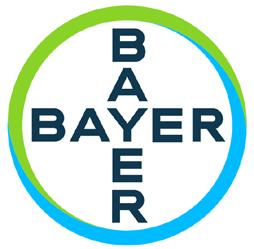
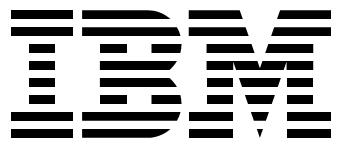
For the use of energy-efficient peak networks, the chairs work with:



and International visibility
Axis 3 chairholders have great national and international visibility and recognition:
• Two CNRS silver medals ( Patricia Reynaud-Bouret , 2019, and Laure Blanc-Fèraud , 2023)
• Pierre Faure Prize from the Academy of Sciences 2020 ( Patricia Reynaud-Bouret )
• Honorary Professor at Warwick University 2022-2027: David J. Wales
• Associate Researcher at the NeuroMat center in São Paulo: Patricia Reynaud-Bouret
They have also been invited plenary speakers at:
• Cosmetic Europe Toxicogenomics Workshop 2021: David Rouquiè
• Theoretical chemistry symposium 2021: David J. Wales
Among event organization made by chairholders , major ones are:
• International meeting on Theory and Molecular Simulation in the Physical Sciences, Cambridge 2023: David J. Wales
• IEEE International Symposium on Biomedical Imaging (ISBI) Nice 2021: Laure-Blanc Feraud and Maria A.Zuluaga
• IEEE International Symposium on Biomedical Imaging (ISBI) Nice 2023: Maria A.Zuluaga
• IHP semester 2022 (Mathematical Modeling of Organization in Living Matter): Patricia Reynaud-Bouret
Collaborations and networks
Major international collaborations are with:
• Cambridge (UK) through the International Chair of David J. Wales
• European Research and Innovation Project (H2020) EU RiskHunter (37 organisations): David Rouquiè
• European H2020 project on “Discovering the cellular landscape of the airways and the lung”: Pascal Barbry
• European consortium Marie Skłodowska-Curie Actions on transcriptome biology (single molecule sequencing): Pascal Barbry
On the national level , we highlight:
• PEPR Molecularxiv: Pascal Barbry
• Equipex 4D-OMICS (UCA and Univ Aix-Marseille) spatial transcrip tomics: Pascal Barbry
• FHU OncoAge: Juliette Raffort-Lareyre


In addition, Axes 2 and Axes 3 of the 3IA Côte d’Azur have formed a working group with the actors in biomedical imaging from the 3IA PRAIRIE (Paris) and M IAI (Grenoble) .

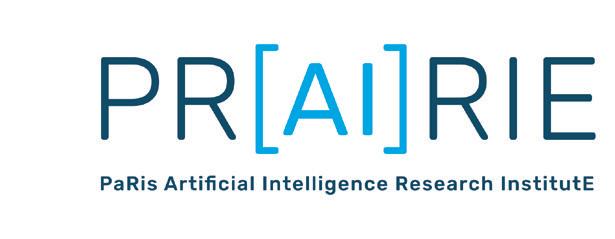
Together, they organized the 1st IABM artificial intelligence conference in biomedical imaging in March 2023 with the participation of Cèdric Villani, wrote a forum “ In medical imaging, making AI an ally ” appeared in the “ Sciences and Medicine” supplement of the newspaper Le Monde on June, 1 2022.
The concept of smart and secure territories refers to sustainable cities, non-urban areas and communities with networked intelligent systems that place the users at their core and deliver personalized services and resources suited to a wide range of behaviors, constraints, and preferences.
Such intelligent systems should help sense complex situations, make decisions, predict risks, extract knowledge from data, and report back to users.
In addition, they should address the challenges of secure territories: Reliability, safety, security, legality, trust , and acceptability
A total of 8 researchers have contributed to Axis 4:
• 3 chairholders since 2019 (Pierre Alliez, Melek Önen, Marina Te ller)
• 4 chairholders since 2022 (Elena Di Bernardino, David Gesbert, Paola Goatin, Cédric Richard)
• 1 affiliate chair since 2020 (Alix Lhèritier)


Chairholders - 2019

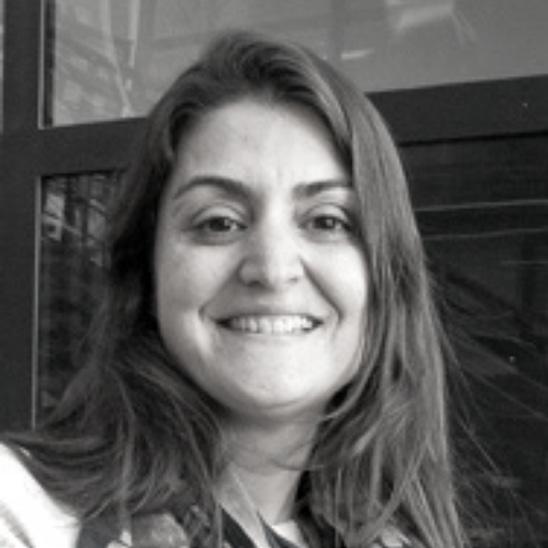

Pierre Alliez , Inria
3D modeling of large-scale environments for the smart territory
We are exploring the generation of rich 3D vector maps with semantic attributes from raw measurement data. We plan to learn geometric priors and error metrics that locally adapt to the semantic class of objects. We are developing a pliant approach with the capability to model the wide range of objects, which abound in open environments of the smart territories.
Melek Önen , Eurecom
Privacy-preserving machine learning
Machine learning has become popular due to cloud computing technology and the increasing number of datasets. Outsourcing computations poses a risk to data privacy. Therefore, our goal is to explore privacy-preserving variants of machine learning techniques while leveraging novel cryptographic methods.
Marina Teller , Universitè Côte d’Azur Deep law for tech (DL4T)
The DL4T team is building the legal framework for deep technologies. Starting from the observation that law is often perceived as a force of resistance to innovation, we want to position our research upstream of technology, to support the emergence of technical standards and to promote a convergence between law and AI.


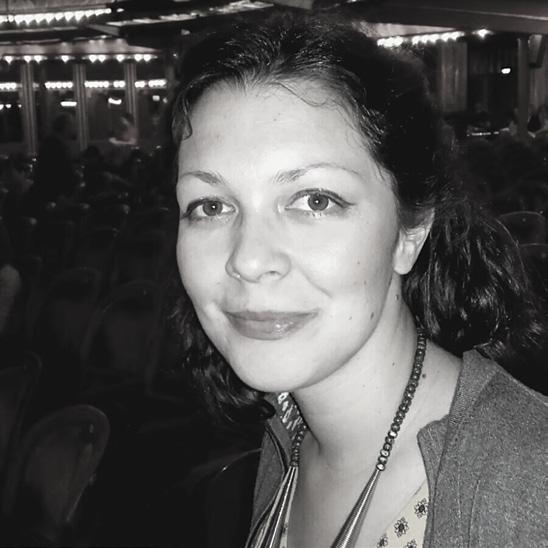
Elena Di Bernardino , Universitè Côte d’Azur Territorial Security through environmental risks management
This project deals with risk assessments related to environmental extreme events. Analyses and predictions of floods, summer heatwaves, and storms are significant questions facing statisticians and risk assessors. Such environmental risks are the result of a long chain of casualties, involving several aleas, often correlated, with complex spatio-temporal dependent structures among extremes. Our contributions in the prevention and management of environmental risks, will be twofold: 1/ Proposing novel and realistic definitions of risks indicators in environmental contexts.2/ Studying in-depth their statistical inference, i.e. specifying more accurately the associated uncertainties. In this project, the skills required to handle the modeling of these uncertainties are stochastic processes and random fields, spatio-temporal models, multivariate extreme theory, as well as practical expertise on spatial and environmental data gathered from firms in 3IACôte d’Azur.
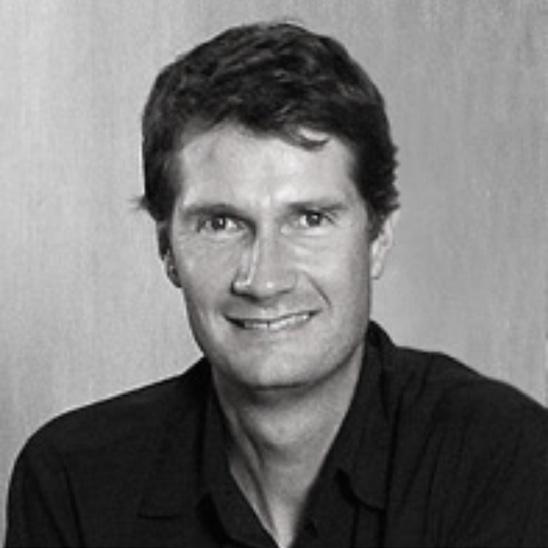
David Gesbert , Eurecom
Internet of Learning Thing, a machine learning approach to future IoT networks
In this chair, we develop cooperative forms of decision making, that can be implemented on distributed IoT devices, and not relying on the assumption that all data is centralized in the cloud. IoT devices can learn to coordinate with each other in their usage of the wireless spectrum, energy, and other resources while dealing with arbitrary noise uncertainties in their observation data. Cooperative machine learning will bring a profound evolution in IoT system design, both at the level of radio access, as well as in the manner services will be orchestrated and how resources will be allocated.


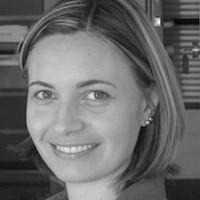
Paola Goatin , Inria
Data
This project aims at contributing to the transition to intelligent mobility management practices through an efficient use of available resources and information, fostering data collection and provision. We focus on improving traffic flow on road networks by using advanced mathematical models and statistical techniques leveraging the information recovered by real data. We are committed in creating a network of local stakeholders sharing knowledge and expertise

Cèdric Richard , Universitè Côte d’Azur
Distributed dark fiber optic sensing for smart cities monitoring
Optical fiber, in addition to being a means of transmitting information, is also a material that is very sensitive to environmental variations. When a laser light pulse travels through an optical fiber, it interacts with tiny impurities in the material and optical backscattering occurs. The round-trip time of the light provides the locations of interactions and allows us to infer a backscattering profile along the fiber. Processing this response provides estimates of the local variations in temperature, deformation or acoustic pressure along the fiber. This technique, called Distributed Fiber Optic Sensing (DFOS), is currently experiencing growing interest. The goal of our project is to develop a breakthrough framework for smart cities monitoring based on DFOS over existing dark fibers, and Artificial Intelligence.
Affiliate chairholder - 2020
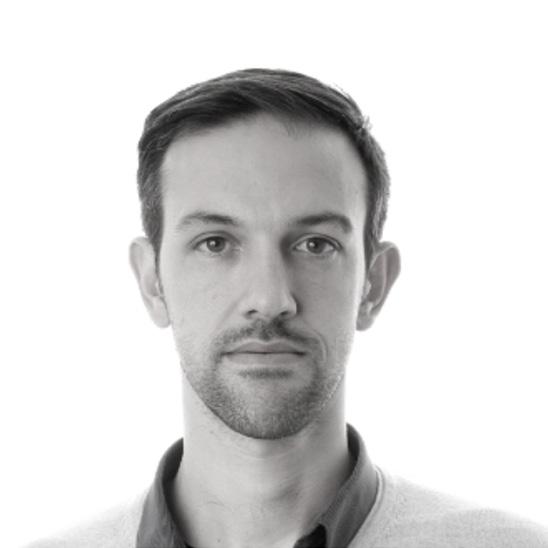
Alix Lhèritier , Eurecom | AMADEUS
Improving the Air Travel Experience via Probabilistic Regression with Epistemic Uncertainty Estimation in Adversarial Scenarios
Motivated by Travel Industry problems like modelling airline ticket price evolution or predicting delays, this chair aims at investigating new approaches for providing predictions with estimates about different types of uncertainty due to imperfect models, lack of data or adversarial inputs.


Industrial collaborations with many companies arise in this Axis in particular:

The chairholders of this axis received prestigious awards like the research grand prize IMT-French Academy of Sciences (Mines-Tèlècom) 2021 ( David Gesbert ), for exceptional contributions to wireless communications and 5G/6G.
They also organized main scientific events like:
• IPAM (UCLA) long program “Mathematical challenges and opportunities for Autonomous vehicles” 2020 ( Paola Goatin )
• 6G Wireless foundations forum 2021 (the General Chair – David Gesbert )
They have been invited to give keynote lectures like to the World Law Association 2021 ( Marina Teller ).
They also lead main research coordination activities like:
• Inria-DFKI partnership since 2022 (Scientific head – Pierre Alliez )
• Coordination of the European project Papaya 2018-2021 (platform for privacy preserving data analytics – Melek Önen )
• AI Verse startup, founded in 2020 (generation of training data for computer vision applications, scientific advisor – Pierre Alliez )


Collaborations and networks
Several national and international collaborations are raised in the context of this axis , i.e.:

In conclusion, the Institute has achieved significant results thanks to the dynamism of the chairholders and their teams. Internationally, the Institute has organized scientific events in major AI venues. In addition, the publication activity and the invited keynote talks show the significant impact of the Institute at the international level.
On a national level, the Institute has strengthened its links with local organizations such as the Nice Côte d’Azur Metropolis and the Mercantour National Park , and hospitals such as the CHU de Nice and the Centre Antoine Lacassagne (CAL) .

These results are based on high-quality scientific contributions on the fundamentals of AI and their applications in computational medicine and biology, and in smart and secure territories. These applications also demonstrate the concrete impact of AI methods and technologies on society.
For example, three chairholders (Nicholas Ayache, Sèbastien Ourselin, Marina Teller) has besome members of the scientific committee of the French Health Data Cluster , while Serena Villata has become a member of the French National Digital Ethics Committee.



3IA Côte d’Azur has placed training at the heart of its strategy, making it one of the 3 fundamental pillars of its work, alongside research and innovation. Right from the start in 2019, the institute had an ambitious target of doubling the number of people trained in AI
The institute is adopting a label that features 22 programs with more than 50% AI content , underlining our commitment to improve the AI training sector in the region. These programs encompass Master of Science degrees , engineering degrees , Master’s degrees , a Bachelor’s degree , a summer school , and microcredential courses .
The results have been extremely conclusive, prompting the four 3IA consortiums to work together to set up the EFELIA project (French AI school) . This new project consolidates the training ambitions of Universitè Côte d’Azur and allows us to speed up and strengthen the AI momentum in our region . Over time, there has been a notable increase in the number of individuals trained in AI across both fundamental and applied domains. A dynamic communication strategy has bolstered the international visibility of our AI programs , attracting students from around the world eager to engage with our innovative educational offerings .
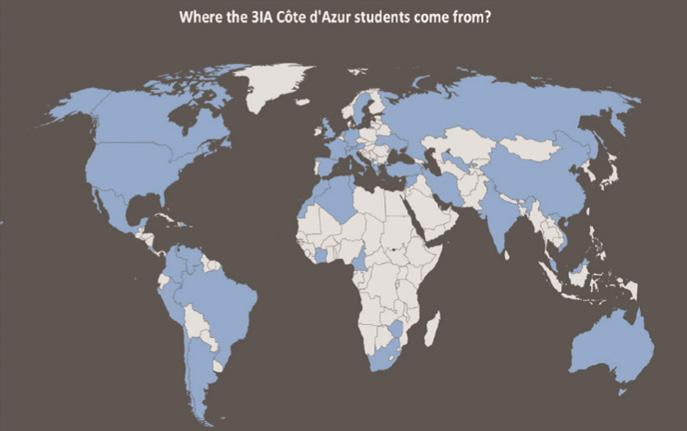


EFELIA Côte d’Azur, in collaboration with the 3IA network, is a project a part of the France 2030 program “ Skills and Professions of the Future ” supported by the French State. Its primary objective is to foster the development of artificial intelligence education across all levels, catering to both specialists and users of AI. Launched in September 2022, it has a budget of 8 million euros over 5 years.
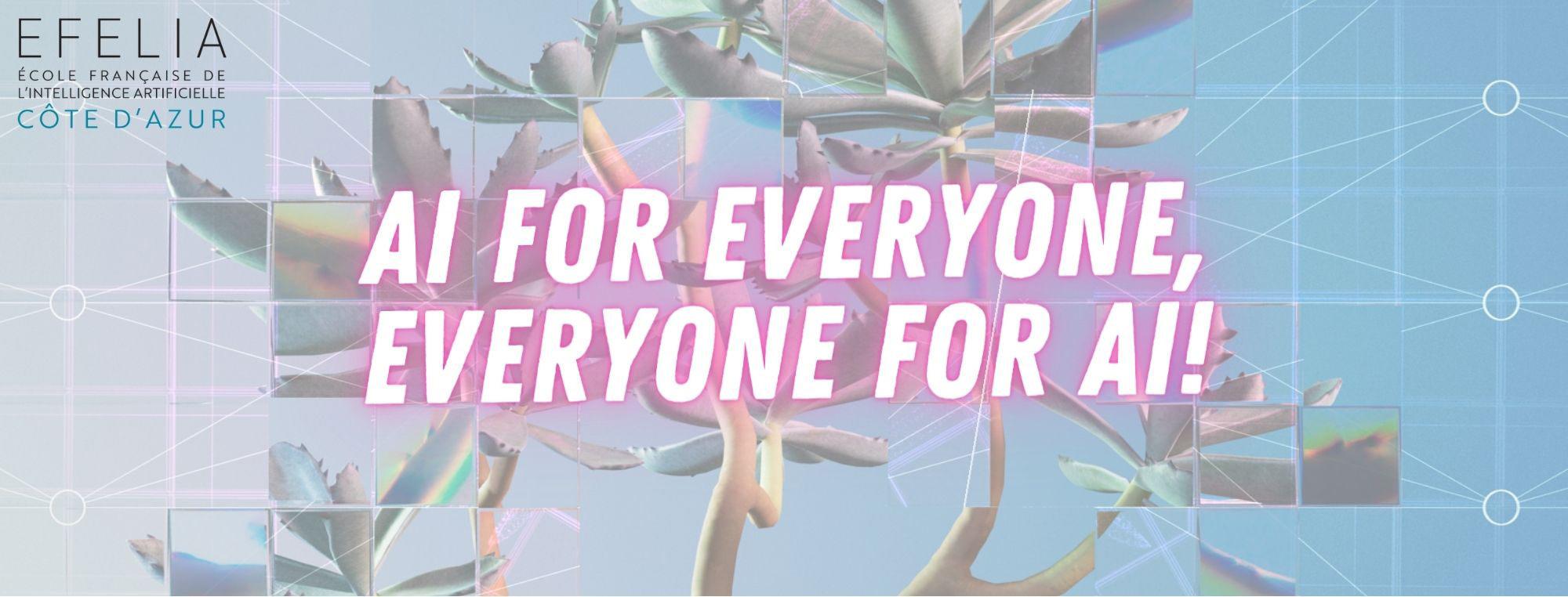
The experts at EFELIA Côte d’Azur , renowned for their scientific excellence , curate training programs aimed at enhancing the skills of diverse audiences in the field of artificial intelligence. Their overarching goal is to enable individuals across various domains to leverage these advancements in their respective areas of expertise, all while comprehending the current challenges inherent in these methodologies. In doing so, this initiative contributes significantly to enriching scientific, economic, and social domains with the most pertinent skills necessary for fostering sustainable progress .
At the core of EFELIA’s scientific direction lies modern AI, representing a collection of methodological advancements in computer science and statistics that are increasingly influencing a plethora of scientific disciplines, economic sectors, and societal dynamics. EFELIA’s mission encompasses two pivotal objectives: Enabling the integration of these advancements across all disciplines and thematic areas, and facilitating an understanding of the limitations and challenges inherent in current techniques.
EFELIA Côte d’Azur adopts an inclusive and diversified approach by catering to various audiences, including university students, educators, high school students, employees, and more . Our team of academic experts develops training programs tailored to a wide array of professional sectors As such, EFELIA offers an extensive selection of training programs, which can be customized or co-constructed, and additionally creates custom programs for local companies, encompassing workshops, conferences, training sessions, and more


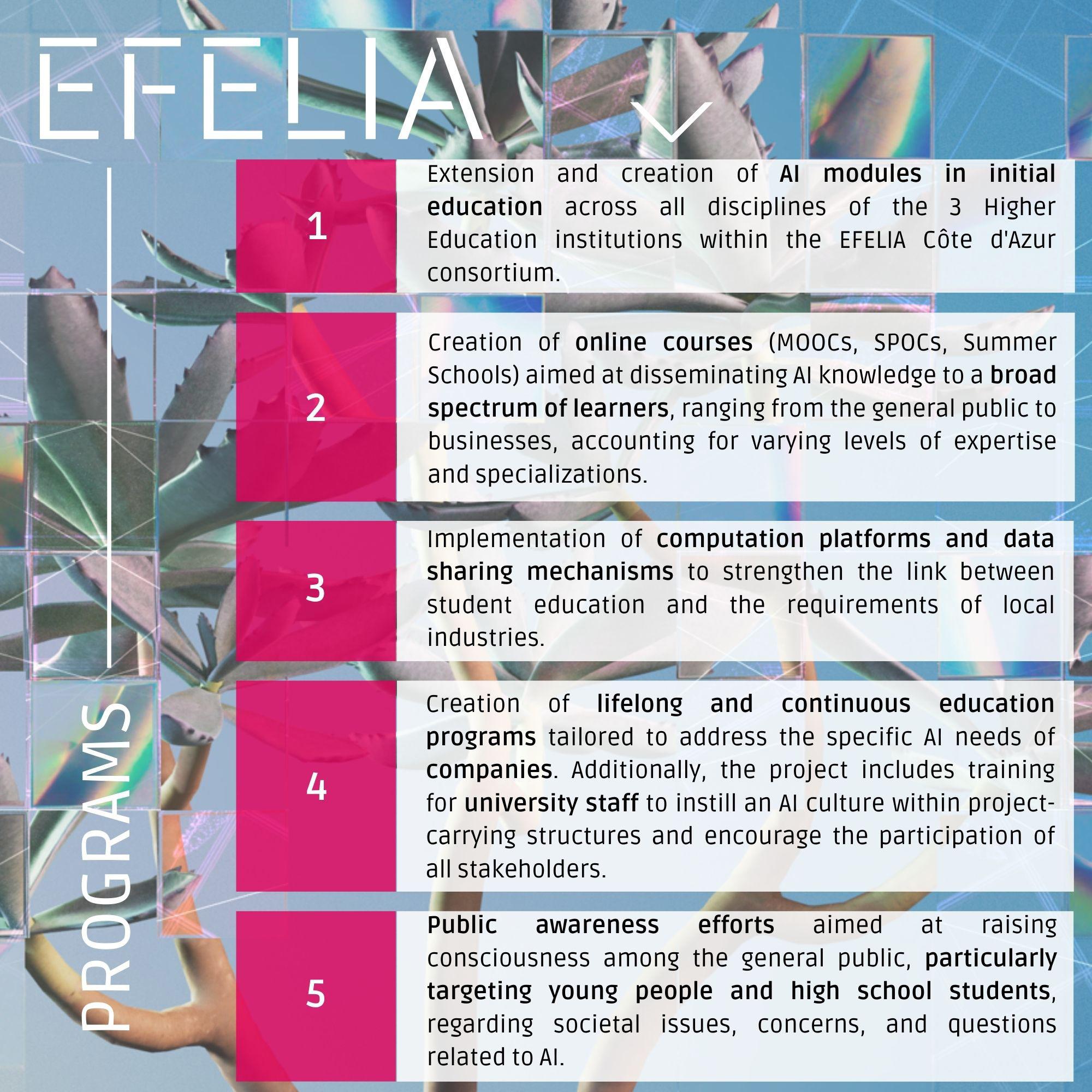


To supplement our permanent academic task force the 81 3IA Ph.D. students have a teaching duty of 64 hours of AI courses per semester. This teaching load was included in their contracts. From the beginning of 2019 until 2023, the teaching potential of our Ph.D. students increased from 640 hours (1st academic year) to 2,600 hours (current acad emic year).

In addition, professors holding a 3IA chair have taught a total of 68 courses since 2019, amounting to 4,600 hours . 75% of professors who hold a 3IA chair and 3IA Ph.D. students have taught their courses at the graduate level and 25% at the undergraduate level. Furthermore, we have strengthened our team by hiring 3 teaching engineers and 4 junior fellows as part of the EFELIA project.
In order to achieve our objective of increasing the number of students trained in AI, we have worked on strengthening AI training in the University Graduate Schools (EUR) and associate components , in a co-construction approach involving the heads of the grad uate schools.



Thanks to the dynamic initiative of EFELIA and the investment of the EUR graduate schools , in particular the heads of the master’s degrees, twelve new minors have been created and are available for the start of the 2023-2024 academic year .
A minor represents 24 hours over a semester , including 12 hours of lectures and 12 hours of field-relevant tutorials, all conducted by EFELIA’s junior fellow . These introductory minors in AI applied to numerous disciplines taught at the Universitè Côte d’Azur are also open to doctoral schools.
This work of co-designing minors will enable us to develop cross-disciplinary competencies in AI for each undergraduate degree by 2024 , as well as modules for the IUT degrees . EFELIA Côte d’Azur has a real desire to create educational content that fits to the needs and interests of each discipline.
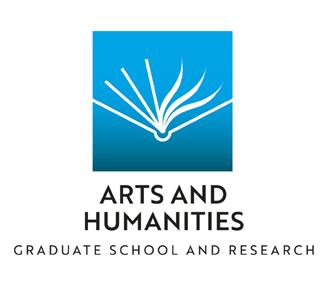
� Introduction to AI for Cultural and Creative Industries
� Introduction to AI for Applied Foreign Languages
� Introduction to AI for Humanities, Social Sciences, and Linguistics
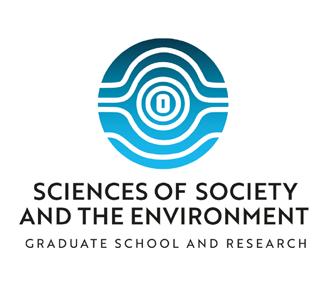
� Introduction to AI for Humanities and Social Sciences: Image and Text Analysis
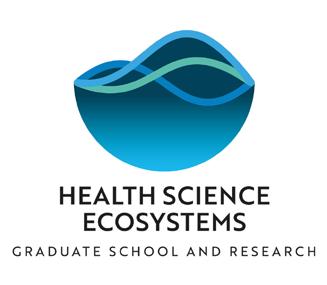
� Introduction to AI Applied to Healthcare Ecosystems
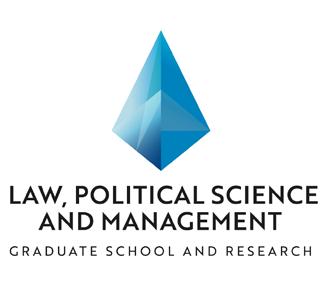
� Introduction to Artificial Intelligence: Applied to Law
� Introduction to Artificial Intelligence Applied to Law and The Challenges for Administration and Public Service
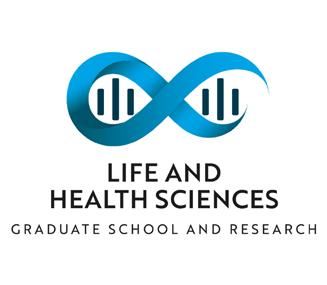
� Introduction to AI Applied to Biology

� Introduction to AI for School Teachers (Primary)
� Introduction to AI for School Teachers (Middle/Secondary)
� Introduction to AI for Adult Education
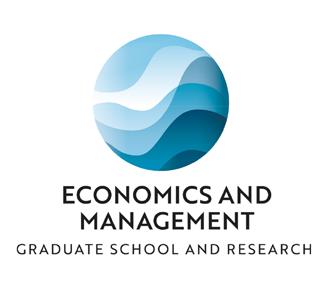
� AI and Societal Transformation
To attract top-level students, we have set up a system of M1 and M2 grants awarded to foreign and French students enrolling in AI courses .



AI summer schools have been integrated into our training program, underlining the importance of fitting the needs of certain subjects. Specialized summer schools are a key way of disseminating knowledge , ensuring that the importance and potential of AI in various academic areas is captured as fully as possible. We currently have 3 summer school programs.
The Deep Learning School brings together more than 350 engineers, researchers and international Ph.D. students for a training week led by international experts
Legal experts take a closer look at artificial intelligence and the challenges it raises.
The DL4T Summer School is open to undergraduate and M1 students at the Faculty of Law and Political Science in Nice. The aim of the Deep Law for Tech (DL4T) project is to contribute to the knowledge, promotion and construction of legal standards governing the creation of technical standards . It is part of the Deep Tech movement. It provides a scientific and standard-setting response to the need for innovative legal frameworks required by emerging technological frameworks .
Theoretical and empirical lectures on knowledge dynamics, industry evolution, and economic development.
Following its 10-year tradition, the KID Summer School aims to attract students interested in studying a broad range of subjects such as the emergence and persistence of innovation, entrepreneurship, firms’ growth, corporate governance and performance, geographical agglomeration and dispersion of industrial activities, skills dynamics, the economics of science, smart cities, and environmental innovation. The school welcomes Ph.D. students, postdocs, and young researchers . Participants of this summer school will benefit from lectures by highly reputed international scholars, which will cover theoretical and empirical subjects with particular emphasis on up-to-date statistical and econometric techniques .


A master’s degree program in collaboration with the Université Laval (Quebec)
The institute launched a master’s degree program in collaboration with the Universitè Laval (Quebec), a long-standing and strategic partner of UCA and 3IA. This project also aims to develop partnerships with Quebec companies within the framework of internships.
Other programs are being developed in partnership/collaboration with University of Bologna (Italy), Lichtenstein, and Santander University (Colombia).
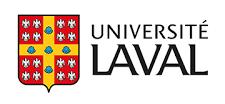


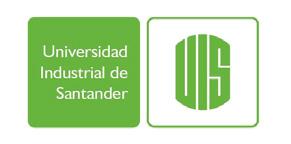
Ulysseus
Within the European University Ulysseus, collaboration with the universities of Seville and Haaga Helia, both leaders in AI, will strengthen the institute activi ties at the European level. We are developing a master’s program in AI with Ulysseus, the European ecosystem, and this project is led by Haaga Helia and 3IA.
“Artificial Intelligence Doctoral Academy” (AIDA)
3IA Côte d´Azur also participates in the “Artificial Intelligence Doctoral Academy” (AIDA) program, and is striving to become a European and world reference in postgraduate AI teaching for Ph.D. students (online courses in English).

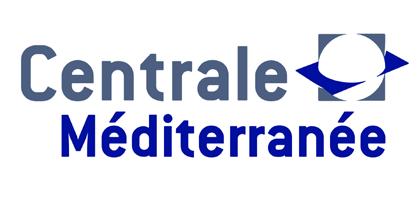
The institute and the È cole de l’air et de l’espace (French Military Air School) have joined forces to develop not only AI initiation programs , but also AI training in space security with the highest degree of excellence.
Twice a year, 3IA Côte d’Azur extends its support to the Centrale Mèditerranèe Institute by providing an AI task force to bolster its AI Program . The dedicated AI task force lends its expertise to enhance the quality and effectiveness of the AI Program, enriching the learning experience for participants and advancing the institute’s mission to cultivate AI talent in the region . Through this partnership, the institute aims to contribute to the broader ecosystem of AI education and innovation, nurturing the next generation of AI leaders.


3IA Côte d’Azur has designed conferences taught in English for EU managers at the Banque de France and BPI France.


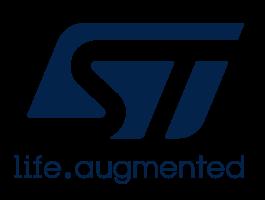
Exemplifying tailored training initiatives, an agreement has been formalized with STMicroelectronics aimed at upskilling engineers and data analysts in the domain of AI . The comprehensive training regimen comprises three intensive five-day modules meticulously crafted around the company’s real-world case studies .
Delivered in a face-to-face format, the program encompasses morning lectures supplemented by afternoon tutorials , focusing on practical applications through individualized use cases. This collaborative endeavor, supported by both Universitè Côte d’Azur and the Universitè d’Aix-Marseille University, underscores the institute’s commitment to fostering regional excellence in AI education and professional development .
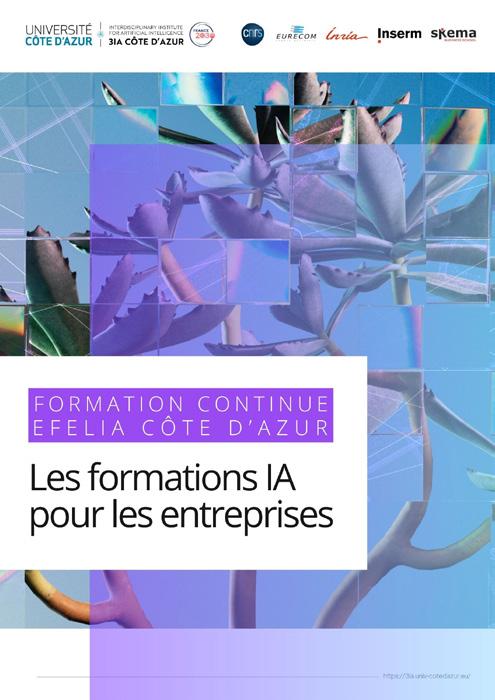
The institute launched a graduate training program “AI & Health” in collaboration with the Nice University Hospital and is currently training 25 doctors in Southern France.


EFELIA has developed a strategy to raise public awareness of artificial intelligence as a new technology that is transforming the way we work, with a significant impact on current and future professions.

The aim is to make French citizens and the general public understand that AI is already very present in our daily lives , that it offers major and varied opportunities, but that it does not do everything, and that it is an area of research in which much re mains to be discovered.
Conferences aimed at a wide audience have been organized to enable all citizens to understand the evolution of the society in which they live. A series of seminars called VOILA! has been launched to give scientific stimulus to our community.
The following indicators show the number of outreach activities carried out in collaboration with the Maison de l’Intelligence Artificielle (MIA) since Octob er 2020:
• School visits: +3,000 students per year
• Conferences and events for companies and regional authorities: +500 people
• Conferences and events for a wide audience: +1,500 people (incl uding online views)



Looking ahead, the institute is committed to a substantial expansion of its training programs across various subjects. We are pleased to announce the establishment of a new partnerships with Tokyo University , aimed at facilitating internships for our Master students in the years to come.
In response to the challenges posed by the limited availability of human resources for teaching AI, the proactive approach adopted by the institute’s leadership has prompted strategic planning for additional recruitment drives in the field of AI instruction in the forthcoming years.
Moreover, the EFELIA project plays an important role in advancing the massification of AI training across all levels and fields, further solidifying our commitment to comprehensive AI education initiatives.



The establishment of the Institute has accelerated the dynamic growth in AI fields throughout the French Riviera . Concretely, the Institute brings scientific and technological added value to companies through collaboration agreements targeting their economic development. It also contributes significantly to the development of the regional policy of Universitè Côte d’Azur and its partners in the innovation and partnership axis.
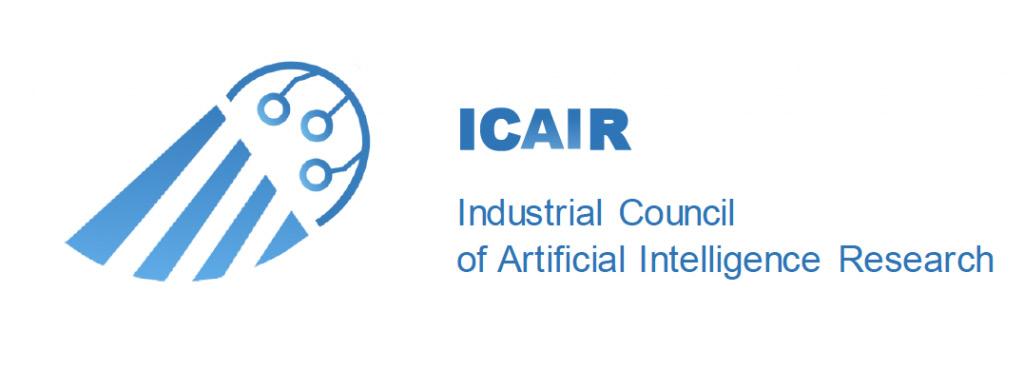

To accelerate the generation of leads and opportunities, the Institute maintains continuous exchanges with local companies, and several clusters such as IC AIR and Cluster IA .
Regarding Axes 2 (AI for Integrative Computational Medicine) and Axis 4 (AI for Smart and Secure Territories), the Institute’s major interactions are with the local authorities and public institutions , in order to position research and technology actions in line with local policies.
Specifically, the Institute is developing partnerships with:

largest European technopole

its smart deal


To date, the Institute has undertaken 5 collaborative projects with the Nice Côte d’Azur Metropolis and the Alpes-Maritimes Dèpartement to scientifically characterize and use the data they have , especially in the fields of Smart Cities and Health .


The Institute also contributes to the international attractiveness of the region by collaborating with Invest in Côte d´Azur agency and Fondation Sophia Antipolis

Invest in Côte d’Azur
Mandated by French authorities and the local economic partners, this agency works to attract external businesses to establish themselves in the Côte d’Azur. To date, the Institute has initiated discussions with about 20 companies introduced by Invest in Côte d’Azur.
Fondation Sophia Antipolis
The Fondation Sophia Antipolis promotes innovation and scientific research. It supports projects in AI, biotech, sustainable mobility, and smart cities within the Sophia Antipolis technopole. The foundation fosters international partnerships, hosts global conferences, and connects researchers, entrepreneurs, and institutions.
To meet the needs of companies, which depend on their size and level of maturity, the institute has established various collaboration formats . In this context, a first industrial chair was signed in 2023 with Dolphin Design .

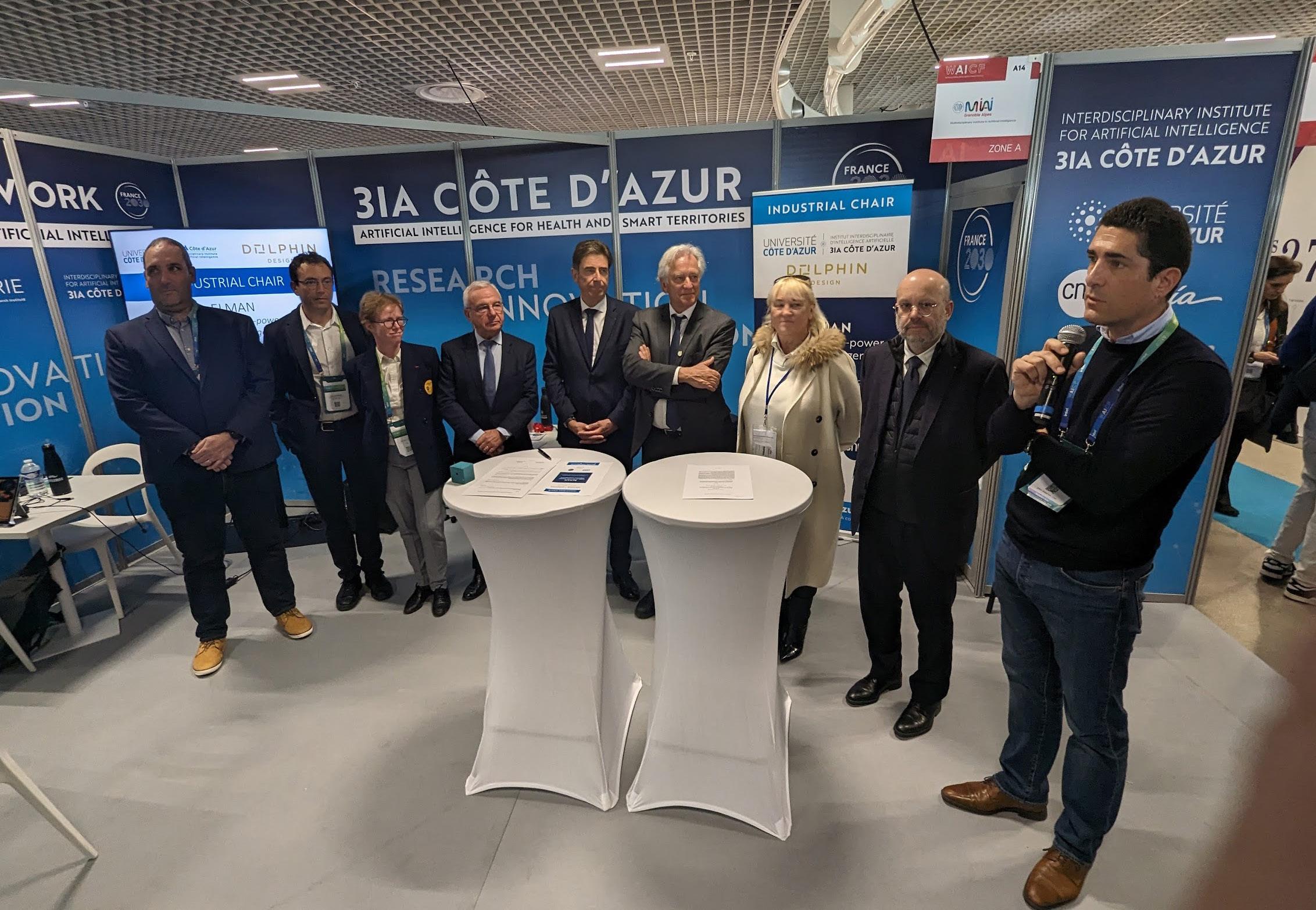


From the outset, the Institute established a “Partnership and Innovation Coordination Unit” as the point of contact to manage external requests.
This Unit brings together representatives from the members’ technology development and transfer services . It oversees various opportunities and monitors the Institute’s performance indicators
Despite the difficult current context, the business sectors remained dynamic, in particular those of health and environment . The slowdown in R&D activities by some of the companies that were initially partners during the health crisis was compensated by new companies which started exchanges or collaborations with the Institute.
As of today, there are more than 140 companies with which the Institute is in contact for actual or planned collaborations. A total of 108 contracts have been signed between a company and one of the Members involving a researcher of the Institute and on a subject related to the themes of the Institute.
Financially, these contracts represent €5.57M of cash income for the Members. The overall financial investment of companies in these contracts, when including their own costs, amounts to more than €16.34M


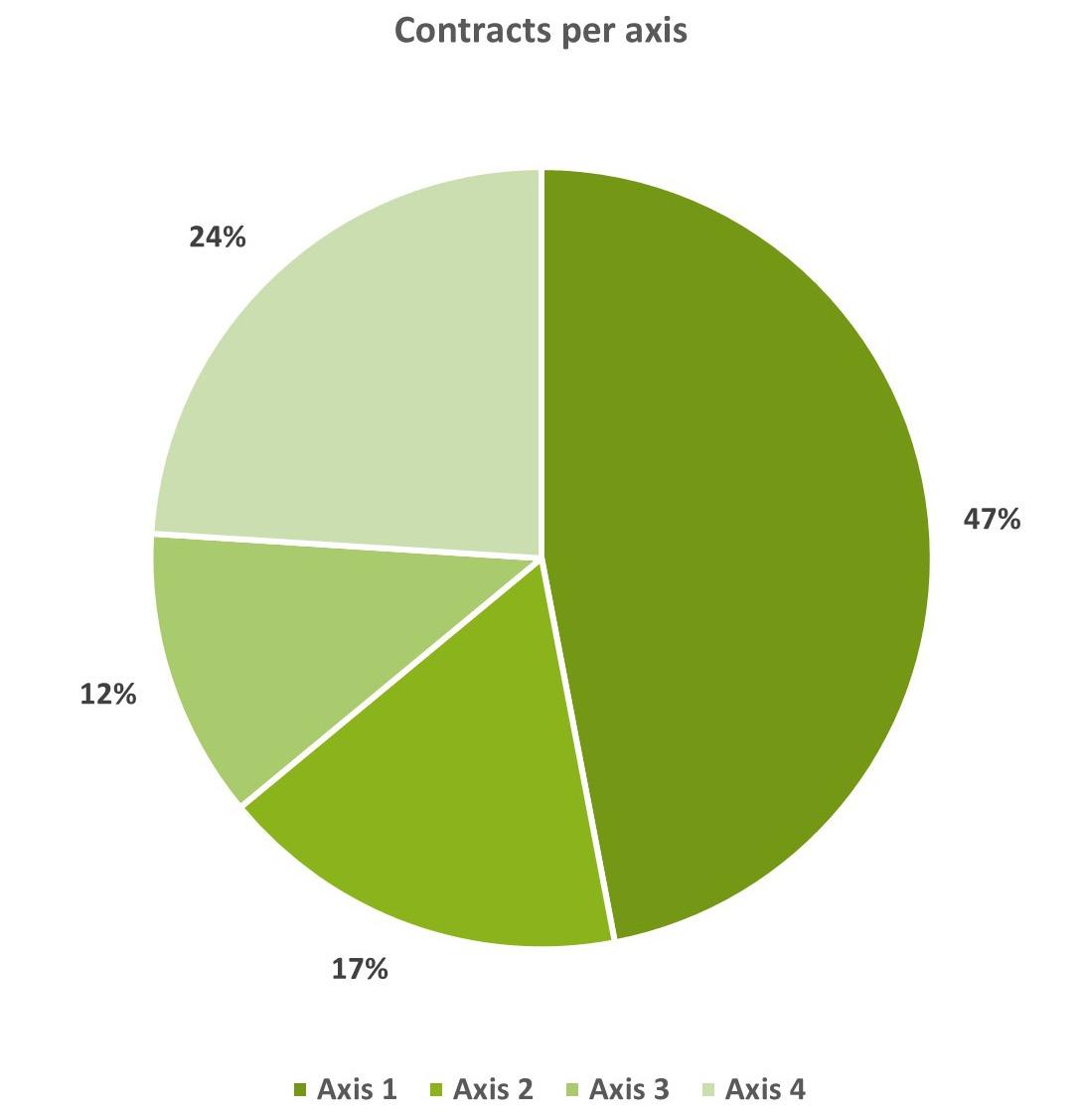
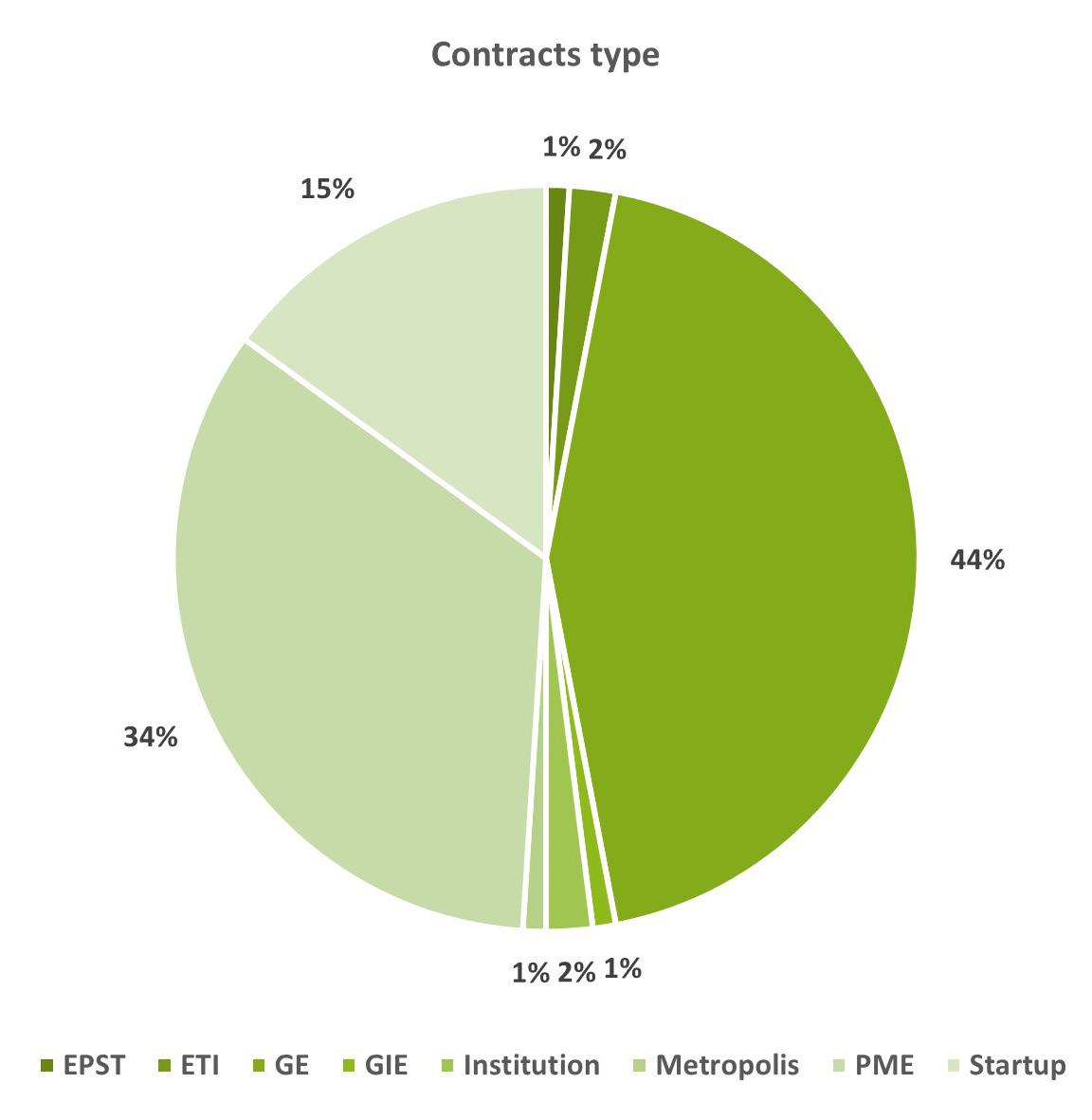
As illustrated in the right figure above, about 39% of the companies are SMEs or startups .
The figure on the left shows the distribution of contract types, indicating the strong interest of the companies for scientific collaborations , and the good dynamics in terms of recruitment of Ph.D.s and Post-docs .
We have tagged the contracts with respect to the main axis they are related to, though they may be related to other axes as well. The first chart provides information about the distribution of the contracts with respect to the Institute’s axes: More than 71% of the contracts are related to Axis 1 and Axis 4 , which highlights the presence of companies that base their business on core AI technologies, and the important trend of businesses concerned with the smart and secure territory.
Financially, Axis 1 and Axis 4 represent 47% and 24%, respectively, of the companies’ investments in partnerships with the Institute.


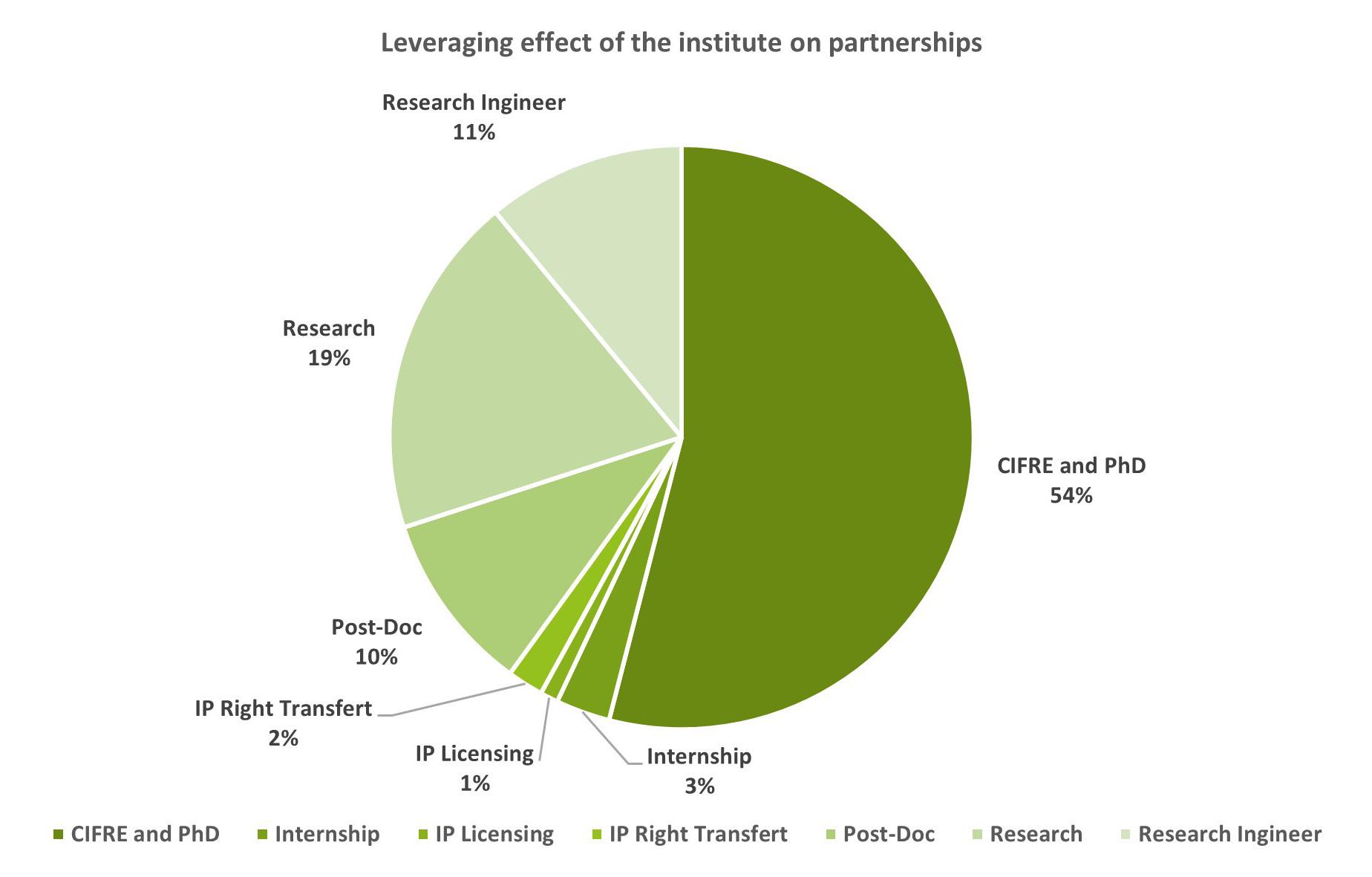
In addition to supporting economic development and startup creation, another leverage effect if the Institute’s ability to attract new companies, as confirmed by the number of contracts signed. A leveraging effect is the 69 Ph.D.s and Post-docs recruited under research contracts
To accelerate partnerships, knowledge transfer, and technology exchange , the Institute has also established the 3IA Techpool , a software engineering platform specializing in AI sciences and technologies
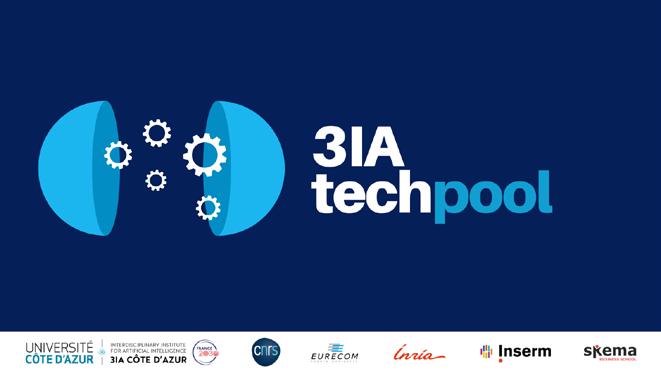
The Techpool comprises 4 engineers in 2023 :
• 3 data scientists responsible for AI projects
• 1 full-stack engineer in charge of developing the 3IA demonstrators’ website and applications related to AI projects.
To date, the 3IA Techpool has been involved in 16 AI-related projects , including internal research projects with various 3IA Chairholders and collaborations with external partners.

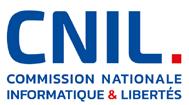



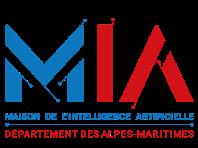

Additionally, the 3IA Techpool has maintained relationships with regional partners such as Maison de l’Intelligence Artificielle (MIA) and Terra Numerica through the presentation of their website.


This interactive website showcases the work of the 3IA Chairs through applications and was also featured at regional events like WAICF and the Science Festival . The website underwent a redesign, and 2 new demonstrators were deployed in 2023 .
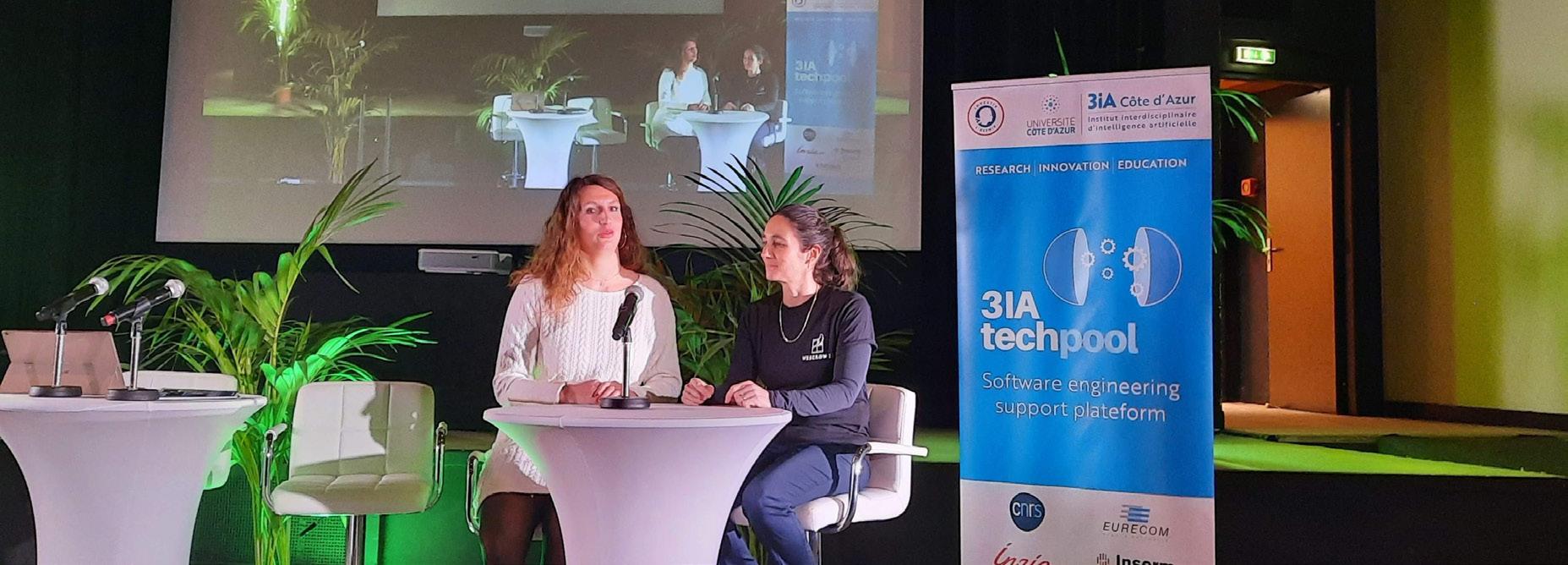
WebCrow is a software system based on AI technology for solving crosswords, designed by Prof. Marco Gori (3IA International Chair, Professor of Computer Science, University of Siena) and members of his team in partnership with the company expert ai. It is based on natural language and constraint satisfaction models for solving crosswords in English and Italian. An extension to French has also been developed with the support of the Institut 3iA Côte d’Azur, which was presented with a crossword challenge at WAICF 2023.
The Institute launched the “3IA demonstrators” initiative, an online digital showcase (https://3iademos.inria.fr/) providing access to technology demonstrators developed by the Institute’s research. Some demonstrators are intended for the general public and others are targeted to the technically advanced public

Discover “3IA demonstrators”


The Institute also contributes to dissemination actions initiated by our partners , such as a contribution to the mapping of AI resources (research, training courses) in the region on behalf of the Chamber of Commerce and Industry of the Alpes-Maritimes .
The Institute is also the main stakeholder in the Maison de l’Intelligence Artificielle (MIA) in Sophia Antipolis. Established by the Alpes-Maritimes Departmental Council, the MIA is open to the public and is dedicated to helping everyone discover AI, especially students from the Dèpartement’s high schools.
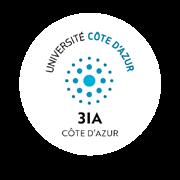
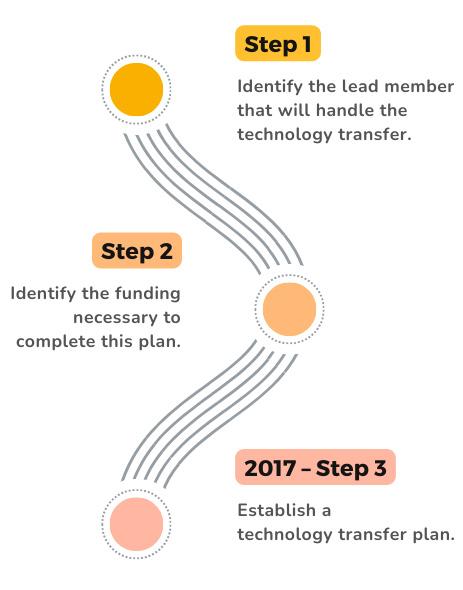
Manage IP assets
Knowledge transfer is one of the ultimate objectives of research by pushing research and technology results into the market. The Institute benefits from the dedicated set up by Universitè Côte d’Azur in the framework of the PUI Med’Innov , which brings together the main 3IA Members, and addresses the issues of valuing multi-partner assets from the Institute, in conjunction with other players in the innovation ecosystem , such as the IPE (Incubateur Povence-Côte d’Azur),, SATT Sud-Est, in charge of managing the patenting of research and technology assets of CNRS and Universitè Côte d’Azur, and the BPI France public bank.
This support is provided as early as possible, even before the launch of the project, in order to establish a technology transfer plan in a consensual manner between the 3IA partners , and to identify the funding necessary to complete this plan.


A particular effort is made to standardize the valuation and transfer policies of the Members , in particular in cases where several partners contribute to the development of the valued technology. It is therefore important to define the valuation scheme as early as possible so that the promoters of the business creation project or industrial partners can have a clear vision of the technology acquisition scheme .
Therefore, identifying as early as possible the lead Member that will handle the technology transfer is a key factor in the success of the proposed transfer .
Typically, this commission allows the different Members of the Institute to agree on the way to manage IP assets generated through mutualized structures such as the 3IA Techpool .
There are three kinds of valorization that have been taken into account:
• Industrial patents
• Software patents
• Software licensing
The Institute ’s research has led to the filling of generated the filing of 13 software patents and 9 industrial patents , of which 6 were jointly filed with partner companies. Among the co-owned patents with companies, 3 were the subject of a transfer ( Ekkinox , Dassault and Google ).
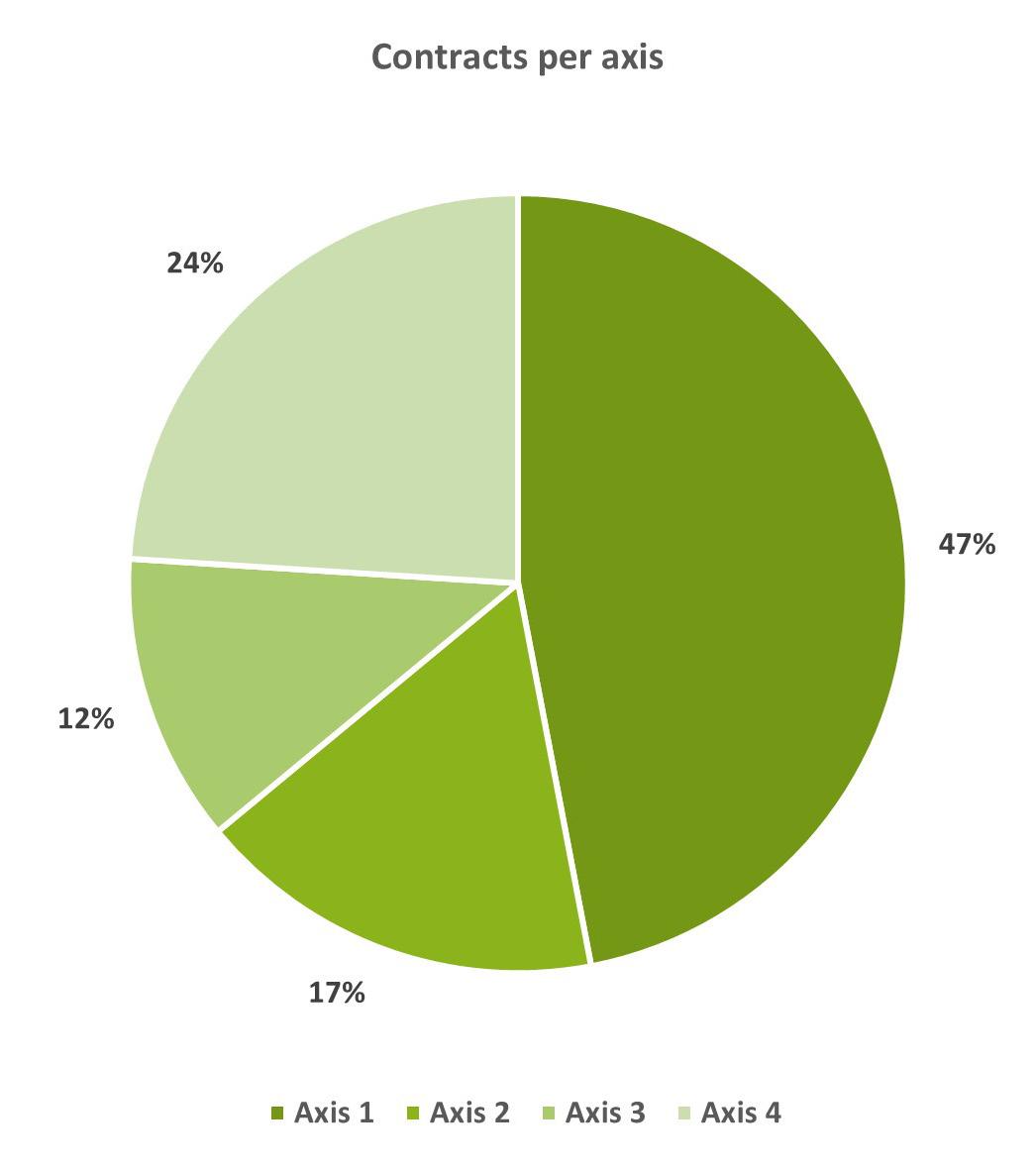
The most prolific axis so far is Axis 1 with 47% of valorization operations , followed by Axis 4 with 24% . The Start-it-up program is meant to accelerate knowledge transfer, by making proposals conditional on the transfer of technology.


The collaborations and discussions initiated during the first 2 years of the 3IA Project have revealed the need to support startup creation projects resulting from or related to the Institute’s research. Therefore, the Institute opened in 2021 a call for projects named “Start-it-up 3IA”. Since its inception, 10 startup projects have been selected. 3 of which have been approved and 3 others are in review and 6 startup projects were incubated through the IPE thanks to the support of 3IA Côte d’Azur.
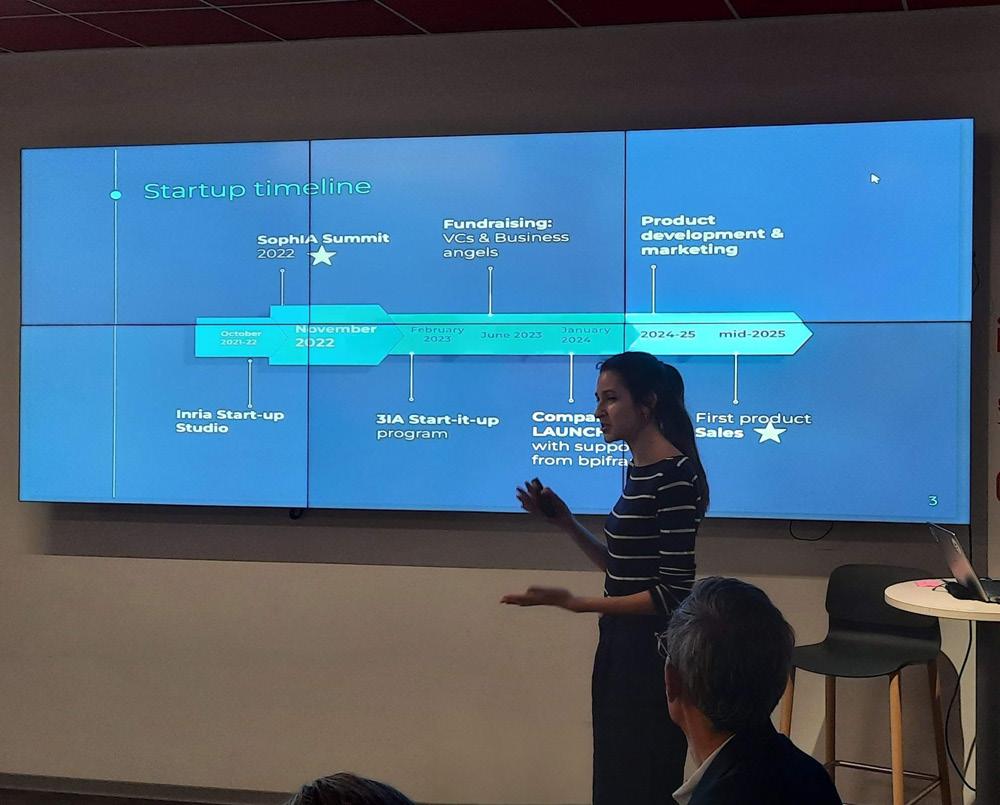
The Start-it-up program is an integral part of the Institute’s ecosystem of support and funding for start-ups. In the photo, the start-up NeuroPin (created by Antonia Machlouzarides) is a fine example of the path taken; it has benefited from the Inria Start-up studio and 3IA Start-it-up, which are totally complementary.


AAP
Limpid
NeuroDec
NeuroPin
Purpose: Develop an algorithm that effectively recognizes ventricular fibrillation requiring the delivery of a defibrillator pulse.
Purpose: implement representation methods that provide a better understanding of the space of the observed scene, and of the objects located within it.
Purpose: Produce AI-based algorithms for simulating and analyzing muscle signals.
Purpose: Develop an AI-based software for augmented neuroradiology, which improves the quantification and tracking of neurological change over time from neuroimages.
Pulse Audition
RLCRS
SECUMAD
SequoIA
SPLEAT by AICO
Purpose: Develop artificial intelligence algorithms for speech enhancement, enabling gains in speech intelligibility in noise. Combined with a design that makes hearing loss imperceptible, Pulse Frames hearing glasses meet the needs of mild-to-moderate hearingimpaired people, enabling them to hear only what they want to hear in noise.
Subject: Maturation of a French-language conversational recommendation system for insurance retailing.
Purpose: Development of a secure multi-sensor homecare solution for elderly people living alone.
Subject: DAS traffic data analysis for the smart city.
Subject: Business maturation project to exploit the SPLEAT low-power neural processor.


The Institute organizes meet-ups with companies through webinars and networking meetings to communicate abouts its offer and generate leads.
Due to the health crisis, the institute could have feared a drop in investments from partner companies. While some of them had to postpone their investments in AI R&D, the efforts made to remain in contact with all the partners in the ecosystem allowed us to maintain the overall level of commitment . During this period, relations with the business community were established through webinars: 6 webinars were organized for a total of 150 participants, 70% of which were from companies
The Institute participates in initiatives organized by its members to gain visibility and attractiveness . For example, the Institute has already organized 3 sessions of the 3IA Research Week for Companies .
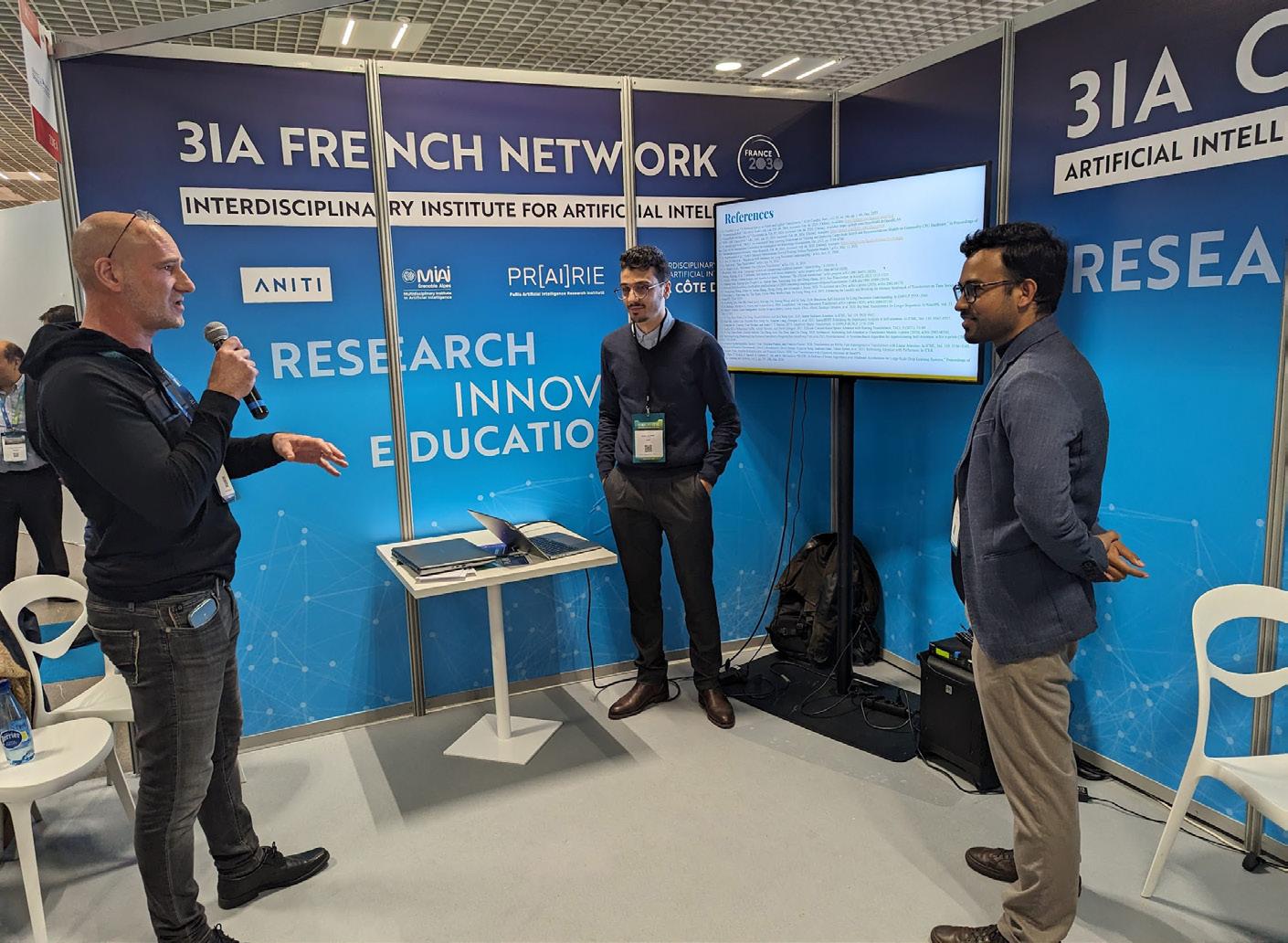
3IA Research Week for Companies: ARM company, students present their work
An annual event , organized with the support of AMIES in the format of ‘job dating’, allowing companies to meet AI specialists (Master’s, doctoral, and post-doctoral level). Appointments are pre-arranged through a matching platform to ensure that candidates’ profiles align with the recruitment needs of the industry. In 2023 , the 3IA Talents Day brought together 9 companies and around 30 candidates





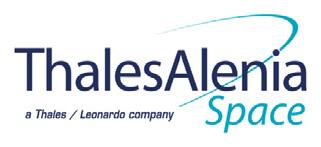


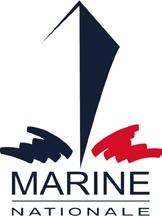


The Institute first of all contributes to reinforcing the visibility of the Universitè Côte d’Azur community at the European level , in particular through its participation in the Ulysseus European University project , of which AI is a priority theme.
An Innovation Hub dedicated to AI aims to federate academic AI skills in the alliance, but also ecosystems more broadly, so as to be able to feed research and innovation in AI at the European Union level , and to position member institutes together for future calls for projects of the European Commission
The Institute is also involved in the AI4media project , a Center of Excellence founded as part of the H2020 European program , which aims to develop artificial intelligence tools for the media, multimedia and audiovisual industries .
As part of this project, our Institute is actively participating in the International Artificial Intelligence Doctoral Academy (AIDA) , the objective of which is to become a European benchmark in teaching AI at the doctoral level . It should be noted that the first course of this academy was given in the Fall 2020 by Prof. Marco Gori , an international chair of the Institute.
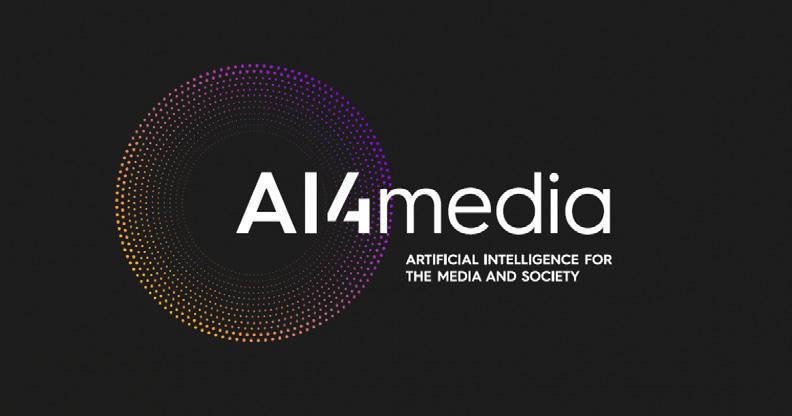
Internationally , the Institute shines through the bilateral collaborations of chairholders , and through institutional collaborations, in particular the strategic partnerships of Universitè Côte d´Azur with Universitè Laval in Canada (co-supervision of 3 doctoral theses in AI, a collaboration which resulted in a publication in Nature Communications, a MITACS Global grant for a Universitè Côte d’Azur student who will visit Universitè Laval for 3 months, etc.), and with the University of Santiago in Chile (Universitè Côte d’Azur, CNRS, INRAE) with which joint research in modeling is applied to agriculture and biocontrol. Discussions are also for instance underway for the development of Franco-German partnerships with Munich, with the Fondazione Bruno Kessler in Italy, and with the Insight Centre in Dublin .


The Institute and OTESIA are also stakeholders of the Digital Innovation & Intelligence Artificial Lab, created in 2020 as part of the U7+ alliance, and whose initial work led to the drafting by the participating universities of a common position paper on the “Role of universities in the production of ethical and responsible AI” .
Finally, we should mention events such as the SophI.A Summit conference and the Deep Learning School , which each year attract around 500 researchers, academic partners and students from different regions of the world
The Institute thus intends, through various partnerships and visible actions, to strengthen its international positioning
They were awarded a 3IA international chair position for extend ed visits with the 3IA Chairs
Prof. Marco Gori (Siena Artificial Intelligence Lab, Italy)
Marco Gori is full professor of computer science at the University of Siena and head of SAILab (Siena Artificial Intelligence Lab). He is also a member of the MAASAI team, INRIA.

His research interests are in the field of artificial intelligence, with emphasis on machine learning, vision, and game playing. In the last few years, he has been mainly involved in the unification of computational processes of reasoning and learning.
He is mostly driven by the principle that the the emergence of cognition is rooted in natural laws of computation.
Research topic: “Learning and reasoning with constraints” Learning and inference are traditionally regarded as the two opposites, yet complementary and puzzling components of intelligence. In the last few years, Prof. Gori has been carrying out research on constrained based models of the environmental agent interactions, with the main purpose of unifying learning, inference, and reasoning within the same mathematical framework. The unification is based on the abstract notion of constraint, which provides a representation of knowledge granules, gained from the interaction with the environment, as well as of supervised examples. The theory offers a natural bridge between the formalization of knowledge, expressed by logic formalisms, and the inductive acquisition of concepts from data.



Sebastien Ourselin is head of the School of Biomedical Engineering & Imaging Sciences at King’s, which is dedicated to the development, clinical translation and clinical application of medical imaging, computational modelling, minimally invasive interventions and surgery. He is Director of the EPSRC Image-Guided Therapies UK Network. He is co-founder of Brainminer, an academic spinout commercializing machine learning algorithms for brain image analysis.
Research topic: “AI for Healthcare & Image-guided Interventions ” This axis aims to generate new fundamental knowledge in medicine to create computational models of the human body and to analyze digital health data in order to improve medical practice in disease prevention, diagnosis, therapy monitoring, and patient rehabilitation. To achieve this purpose, this axis uses data-driven methodological approaches based on machine learning, but also on the integration of mathematical models of human anatomy and physiology. A typical example is the generation of a digital patient which integrates patient data of various natures and at various temporal and spatial scales and analyzes these data to solve a wide range of clinical tasks. A major issue for this axis is how to manage personal and health data while enforcing data privacy and security requirements. This can be handled both by the development of new technologies (such as federated learning) and by the action of dedicated organizations (hospitals, health data hubs, etc.). The main clinical applications of this axis are in neurology, neuroimaging, oncology (prostate, lung, thyroid, abdomen, etc.), cardiology, vascular diseases, nuclear medicine, digital pathology, and functional rehabilitation.


David Wales (University of Cambridge, UK)
David Wales is Professor of Chemical Physics in the Department of Chemistry at the University of Cambridge.
His research interests include: Computational physics, quantum theory, chemistry, biological, chemistry, materials, chemistry, physical, chemistry, theoretical, molecular medicine, applied mathematics and theoretical physics.

He was awarded the Meldola Medal and Prize in 1992 by the Royal Society of Chemistry and the Tilden Prize in 2015. In 2020, he received a Humboltd Research Prize from the Alexander von Humboldt Foundation.
Research topic: “Solution landscapes for Machine Learning”
Prof. Wales explore machine learning landscapes in the cost function parameter space, which is analogous to the potential energy surface of a molecule as a function of atomic coordinates. Ongoing advances in methodology developed in chemical physics, can therefore be immediately applied to ML solution landscapes. His objectives are to use these tools to design improved predictions, and apply them to problems in molecular science and health care. In particular, he seeks improved machine learning tools for clinician diagnostic support, to provide earlier detection of the deteriorating (and improving) patient. Specific applications include prediction of readmission to intensive care, which represent a failure in downtransfer to the ward, and are often associated with patient mortality.
Seven professors benefited from this program (4 in 2022/2023)
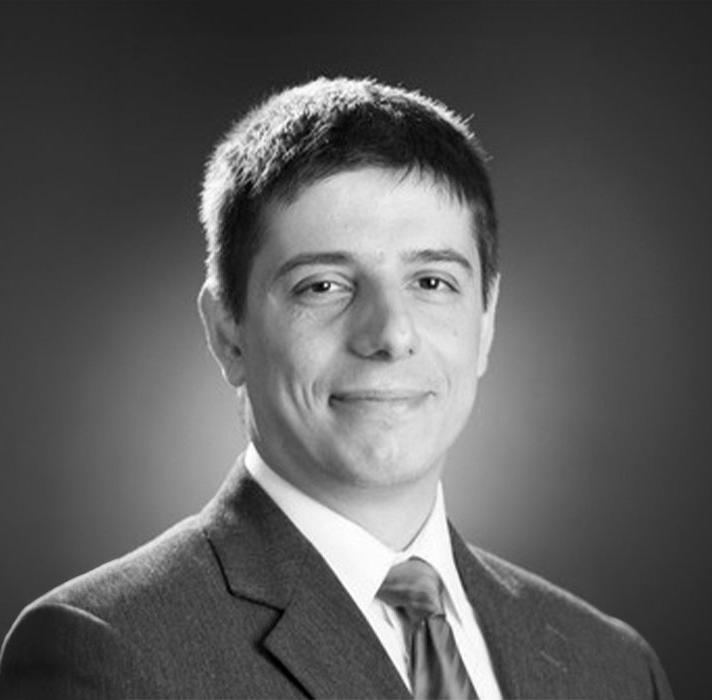
Hazim Kemal Ekenel
Professor at ITÜ Department of Computer Engineering (Turkey), where he directs the Smart Interaction and Machine Intelligence Technologies (SiMiT) Lob.
Main research interests: Leverage computer vision, machine learning, and deep learning techniques in order to build interactive and intelligent systems that ease people’s lives and enhance their social interactions. He also focuses on assistive technologies for people with disabilities and healthcare applications..


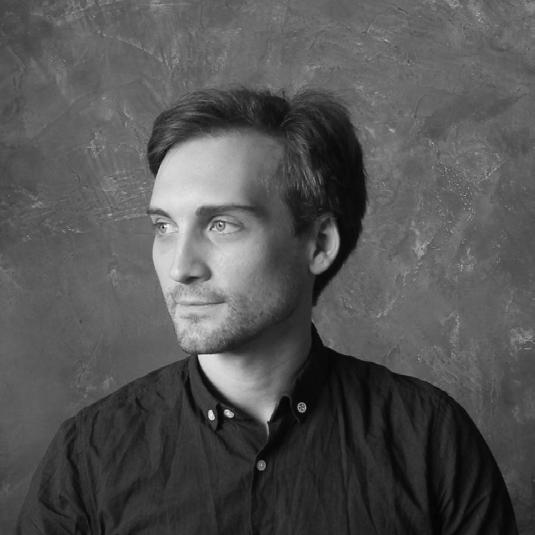
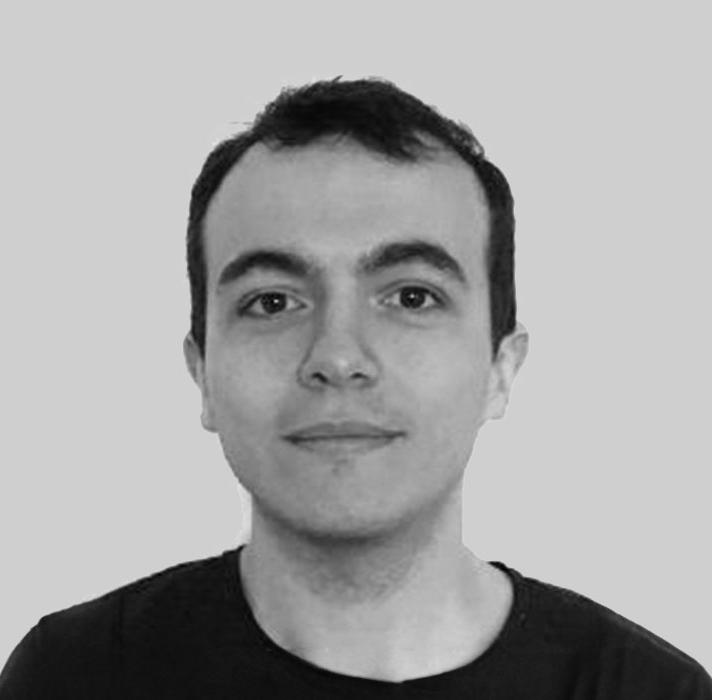
Mathieu Lauriére
Assistant professor of Mathematics and Data Science at NYU Shanghai (China), former postdoctoral fellow at the NYU-ECNU lnstitute of Mathematical Sciences at NYU Shanghai and former postdoctoral research associate at Princeton University (USA), in the Operations Research and Financial Engineering (ORFE) department. Main research interests: Mean field contrai and mean field games, numerical methods, partial differential equations, stochastic analysis, machine learning, complexity theory and quantum computing.
Thibault Lejemble
Associate Professor at EPITA - LRE Toulouse (France), member of the Image team at LRE, associate member of the STORM team at IRIT.
Main research interests: Analysis of 3D acquired data and especially 3D point clouds, development of efficient algorithms to process unstructured and large point clouds acquired by 3D scans using Lidar sensors and photogrammetry, pattern recognition, curvature estimation and reconstruction, efficient implementation of algorihms on GPUs using opensource framework.

Nicoló Navarin
Associate Professor in Computer Science at the University of Padova (Italy), former research fellow at the University of Nottingham (UK), and at the University of Padova, former visiting researcher at the University of Freiburg (Germany).
Main research interests: Artificial intelligence, and more specifically machine learning on structured data, Kernel methods, artificial neural networks, statistical learning theory, online learning, machine learning for bioinformatics, business process mining, remote sensing.


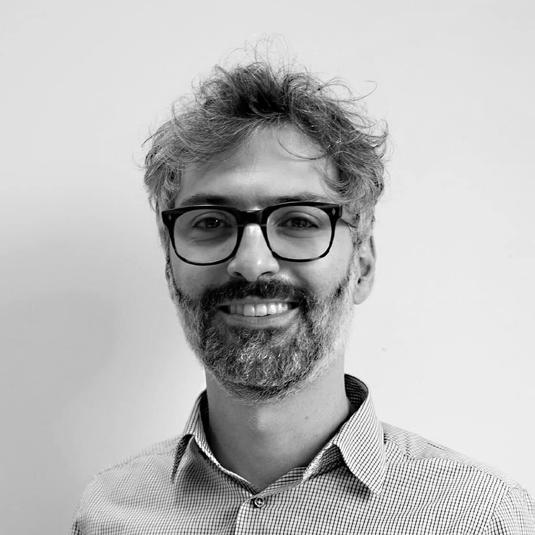
Matteo Palmonari
Full-time researcher at DISCo (Department of Computer Science, Systems, and Communication) at the University of Milan-Bicocca (Italy), Second Level professor for the competition sectors 01/B1 - Computer Science and 09/H1 - Information Processing Systems holding the National Scientific Qualification, general coordinator of the European H2020 project EW-Shopp - Supporting Event and Weather-based Data Analytics and Marketing along the Shopper Journey H2020, coordinator for UNIMIB in the European H2020 project EuBusinessGraph: Enabling the European Business Graph for lnnovative Data Product and Services, and member of the steering committee of the Big Data Value eCosystem project.
Main research interests: Semantic of data and services, and artificial intelligence.

Adrian Raftery
Professor of Statistics and Sociology at the University of Washington in Seattle (USA), member of the United States National Academy of Sciences, a fellow of the American Academy of Arts and Sciences, an honorary member of the Royal Irish Academy, a member of the Washington State Academy of Sciences, a fellow of the American Statistical Association, a fellow of the Institute of Mathematical Statistics, and en elected Member of the Sociological Research Association.
Main research interests: Bayesian model selection and Bayesian model averaging, model-based clustering, inference for deterministic simulation models, and the development of new statistical methods for sociology, demography, and the environmental and health sciences.
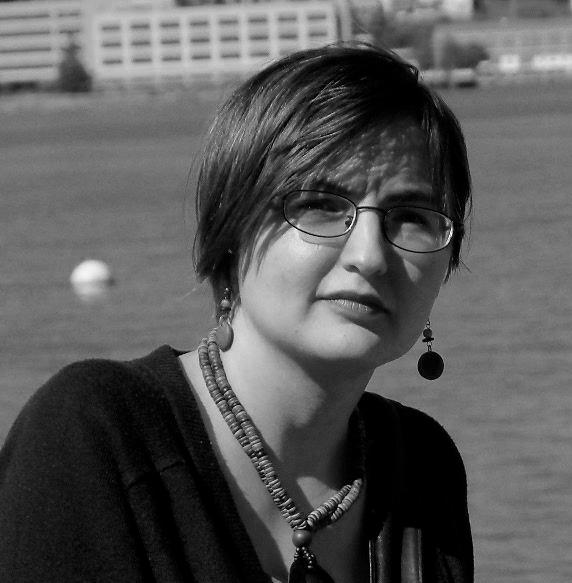
Muresan Smaranda
Research scientist at the Data Science tnstitute (DSI) and the Department of Computer Science at Columbia University (USA), adjunct associate professor in the Department of Computer Science, Amazon Scholar, and co-founder of the Laboratory for the Study of Applied Language Technologies and Society at Rutgers University (USA).
Main research interests: Human-centric natural language processing for social good and responsible computing.



The 3IA Côte d’Azur Institute is coordinated by Universitè Côte d’Azur in partnership with the key higher education, research and innovation institutions in the Nice Sophia Antipolis region: Inria, CNRS, INSERM, and EURECOM.
In December 2021, SKEMA Business School, which had supported the project since its inception, formally joined the consortium.
The overall budget of the Institute was €49.5M over 4 years when the project was approved. With SKEMA joining the consortium, the global budget now amount s to €51.5M.
Director: Charles Bouveyron (Universitè Côte d’Azur & Inria)
Scientific Directors:
Nicholas Ayache (Inria)
Serena Villata (CNRS)
Excutive Director: Diana Sebbar (Universitè Côte d’Azur)
LOCAL COORDINATION COMMITTEE
SCIENTIFIC COUNCIL
INDUSTRIAL COUNCIL
ADVISORY COMMITTEE
RESTRICTED STEERING COMMITEE
Representatives of partner institutions: Jeannick Brisswalter (Universitè Côte d’Azur, coordinator)
Other partners institutions: Maureen Clerc (Inria), Aurèlie Philippe (CNRS Côte d’Azur), Pascal Gros (EURECOM), Dominique Nobile / Claire-Isabelle Coquin (INSERM PACA Corse), Philippe Monin (Skema)
Representatives of EFELIA Côte d’Azur: Lucile Sassatelli, Vincent Vandewalle, Violette Assati
Members of the steering committee, representatives of the structures involved in the Institute (research unit, EUR, etc.), other representatives of the ecosystem
PARTNERSHIP & INNOVATION COORDINATION
Alain Prette
Marc Barret
Amar Bouali
TRAINING COORDINATION
Aurèlie Delort
Lèa Hollander
ADMINISTRATIVE & FINANCIAL COORDINATION
Anne Rosier
Diana Sebbar
COMMUNICATION
Leila Jaber


The management is ensured by the director assisted by an executive director, a scientific director and a deputy scientific director. This Executive Committee makes all the decisions, after consulting with the restricted steering committee.
It is a key body which includes the representatives of the partner institutions and meets every two weeks to discuss the strategic orientations and the actions of the Institute. In an extended form (Extended Steering Committee), it includes all the structures involved in the Institute (such as labs or graduate schools) and other representatives of the ecosystem. This extended committee meets twice a year to give advice on the Institute’s positioning within the overall UCA community policy.
The Scientific Council
It led by the Scientific Director. Its mission is to give advice on the scientific and training program, and to referee the selection of new Chairs, Ph.D. students and post-doctoral researchers.
In order to better coordinate the Institute’s strategy with respect to the ecosystem, a monthly Local Coordination Committee led by the director of 3IA brings together all the public actors of the Region such as local authorities, industrial network representatives, the MIA, and the observatory OTESIA and coordinates AI-related activities in the region.
For advice on its innovation program, the Institute calls this Council composed of representatives of partner companies and clusters. It is headed jointly by the Institute’s director and by a representative of a partner company.
The Advisory Committee
Set up in 2022, it is composed of members external to the consortium and includes at least 1/3 of industry representatives. The constitution of this committee matches the strategic committee of the Universitè Côte d’Azur community. This committee meets once a year to give its opinion on the Institute’s orientations.


At an operational level, the Executive Committee is assisted by those in charge of specific actions: A project manager for all the Institute’s activities, two coordinators for relations with companies, a training coordinator, and a communication and community manager. The members of the Executive Committee and the people in charge of actions meet regularly to discuss the strategy implementation. A seminar was also organized in 2021 for all Member staff involved in implementing the project (more than 50 people) at the initiative of the Institute for the purpose of strengthening the sense of belonging, reinforcing coordination around the project and reflecting on actions undertaken together.
An administrative and financial coordination unit headed by the executive director of 3IA shares information with the administration of partner institutions: Rules for the use of resources and recruitment; legal documents (consortium agreements, conventions, etc.); organization of the declaration of expenses for reimbursement and financial statements and monitoring of the project progress indicators.
A Business Relations Coordination Unit, headed by the 3IA coordinators, meets regularly to monitor the Institute’s relations and contracts with its partners. A common CRM tool has been set up for this purpose. This Unit also supervises and coordinates the Techpool’s activity. The followup of training courses and students is ensured by the Training coordinator of the Institute in collaboration with the partner institutions and the components of Universitè Côte d’Azur. Two pedagogical engineers have recently been hired to strengthen th e 3IA student network.
A shared unit has been set up to coordinate the initiatives of all partners in order to maximize the impact of communication about the Institute’s actions. This unit is naturally well connected with similar services of the network of 3IA institutes.
All researchers of the Institute (chairholders and their teams) have access to the computing infrastructure (OPAL project) shared by Institute members, which already offers a reasonable computing capacity for AI and HPC.
In addition to these local infrastructures, access is provided at the national level to France’s most powerful supercomputer for research, named after Jean Zay. The Institute contributed to OPAL, the local computing infrastructure, by purchasing a cluster node with several GPUs, which will be used in priority by 3IA researchers and engineers .


The global budget now amounts to €51.5M broken down as follows:
• €19M funded by the French state through the ANR, including €3M following the successfull mid - term evaluation.
• €16M by the public partners of the Institute.
• €16,5M of total investiment by companies.
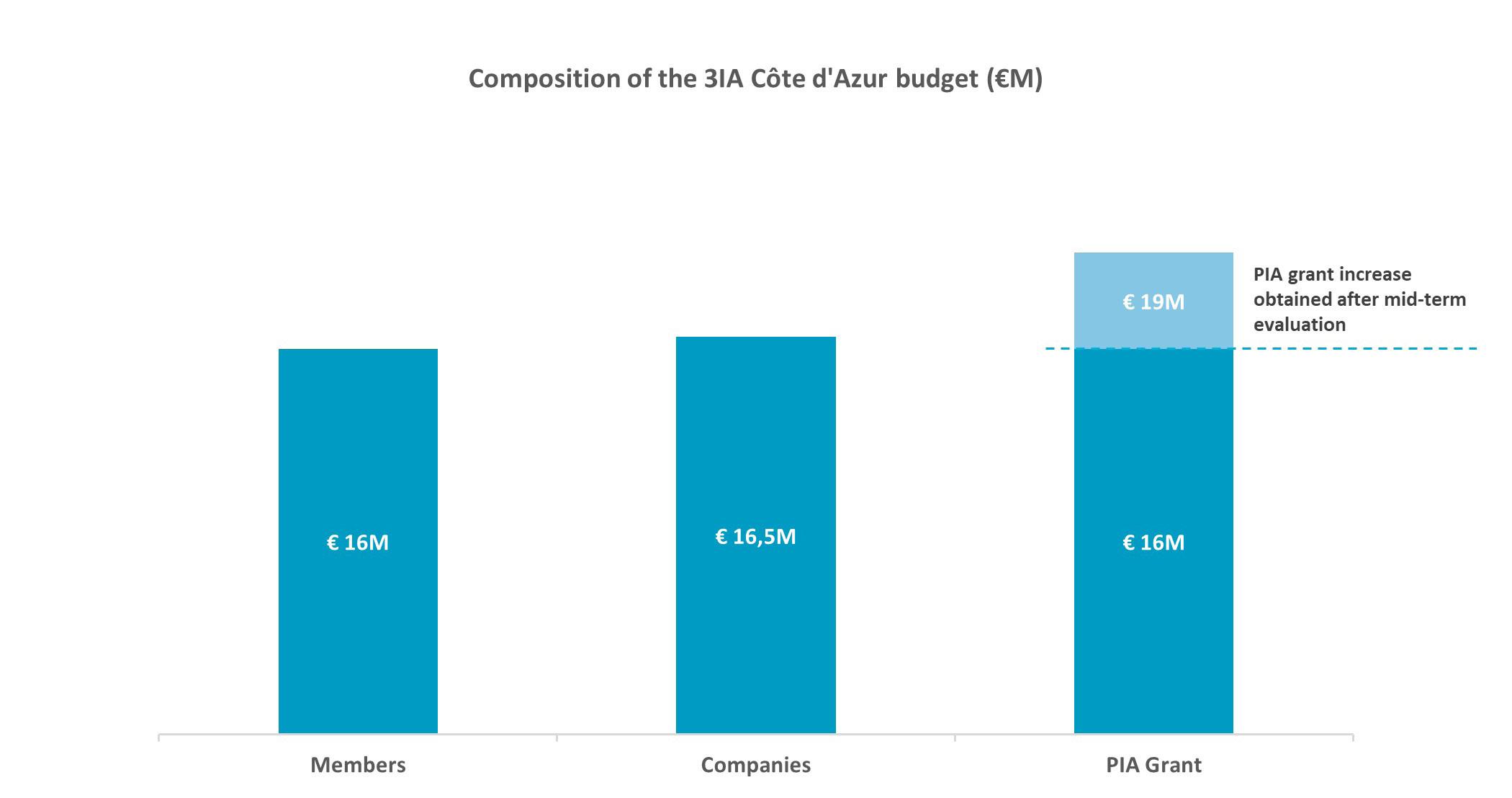
A large part of HR expenses, the largest budget item, were committed during the first year of the project so that the activity of the Chairs could start quickly. The recruitment of Ph.D. students and post-doctoral researchers as well as the bonuses of the Chairs are financed from the PIA grant. Operating packages, co-financed by the PIA and by the partner institutions, are made available to the Chairs each year.


Other resources will be financed by contributions of the industrial partners as defined in the contracts. At the start of the project, 62 companies supported 3IA Côte d’Azur by committing to carry out collaborative research and development projects with the Institute for a total estimated amount of €18.7M. To date, 3IA Côte d’Azur is in contact with more than 140 companies for actual or planned collaborations. 108 collaboration contracts have been signed with companies, bringing in more than €5.57M in cash to the Members. At the end of 2023, the investment of these companies for these contracts is more than €16.34M. The potential investment of companies is estimated at €19M by 2023. In order to further increase the momentum, the Institute plans to set up an incentive system for researchers who engage in collaborations with companies. This system will be financed by the resources provided by the co mpanies.
The Institute also aims to raise other funds, notably through grants (CASA, for example, provides an annual grant of €30,000 to 3IA), or by responding to national or European calls for proposals for Chairs or structuring projects (e.g., a project submitted in response to the call for expressions of interest “ Digital demonstrators ” ).



Name of the institution Research units
INRIA ABS
INRIA - Universitè Côte d’Azur ACUMES
INRIA Athena
MINES Paris - Tech CMA
INRIA Datashape
Eurecom Data Science department
Eurecom Digital Security department
Eurecom Communication Systems department
INRIA Epione
CNRS - Universitè Côte d’Azur GREDEG
INRIA HEPHAISTOS
CNRS - INRIA - Universitè Côte d’Azur I3S
CNRS - INSERM - Universitè Côte d’Azur iBV
CNRS - Universitè Côte d’Azur IPMC
CHU Nice Biochemistry Laboratory
OCA - CNRS - Universitè Côte d’Azur LAGRANGE
Universitè Côte d’Azur - CNRS LEAT
Universitè Côte d’Azur - CNRS LJAD
INRIA - Universitè Côte d’Azur MAASAI
CNRS MDSC
INRIA - Universitè Côte d’Azur Morpheme
INRIA NEO
Centre Antoine Lacassagne Nuclear Medicine Department
INRIA Stars
Universitè Côte d’Azur - CEA TIRO-MATOs
INRIA Titane
INRIA - Universitè Côte d’Azur Wimmics
SKEMA SKEMA AI Institute


Davide Adamo (Supervisor: Marco Corneli) CNRS
AI for archaeozoology: Learning methods to identify and cluster faunal remains
Julien Aubert (Chair of Patricia Reynaud-Bouret ) CNRS
Estimating the learning process of the brain
Madina Bekbergenova (Supervisor: Louis-Felix Nothias) Universit è Côte d’Azur
Deep reinforcement learning for metabolomics mass spectrometry data acquisition
Olivier Bisson (Chair of Xavier Pennec ) Inria
Geometry, stratification and applications of structured correlat ion matrices
Hava Chaptoukaev (Chair of Maria A. Zuluaga ) Eurecom
Artificial Intelligence Tools for Preventive E-medicine
Ryan Cotsakis (Chair of Elena Di Bernardino ) Universitè Côte d’Azur
Open problems in spatio-temporal extreme-value modeling
Eloise Da Cunha (Supervisor: Auriane Gros) Universitè Côte d’Az ur
Automated acoustic Classification as a new tool of Evolution’s prediction of neurodegenerative diseases
Greta Damo (Chair of Elena Cabrio ) Universitè Côte d’Azur
Argument-based counter narratives generation to fight online hat e speech
Zakarya El Khiyati (Supervisor: Jèrèmie Bec) CNRS
Reinforcement learning for the optimal locomotion of micro-swimmers in a complex chaotic environment
Federica Facente ( Nicholas Ayache in collaboration with Pierre Berthet-Rayne ) Inria
Learning Statistical and Biomedical Models for multimodal image analysis – application to ImageGuided Surgical Robotics
Rèmi Felin (Chair af Andrea G.B. Tettamanzi ) Universitè Côte d’Azur
Evolutionary Axiom Discovery from Knowledge Graph
Morgane Fierville (Chair of Pascal Barbry ) CNRS
Spatial imaging transcriptomics of the human lung from health t o pathologies
Sara Frusone (Chair of Vincente Zarzoso ) Universitè Côte d’Azur
Multimodal machine learning for patienttailored catheter ablation of persistent atrial fibrillation
Francesco Galati (Chair of Maria A. Zuluaga ) Eurecom
Interactive and Collaborative Learning for 3D Vessel Segmentati on
Pierpaolo Goffredo (Chair of Serena Villata ) CNRS
Natural language counter argumentation to fight online disinform ation
Mariam Grigoryan (Chair of Vincent Vandewalle ) Universitè Côte d’Azur
Identification of molecular patterns to inform about chemical sa fety


Lisa Guzzi (Chair of Juliette Raffort-Lareyre ) Universitè Côte d’Azur, Chu Nice
Automatic segmentation of the vascular system to enhance AI-based decision support system for peripheral artery disease
Louis Hauseux (Supervisor: Konstantin Avrachenkov) Universitè C ôte d’Azur
Classifiers on random graphs with applications to social network s and image processing
Lucia Innocenti (Chair of Marco Lorenzi ) Inria
Multi-centric AI-based frame-work for prostate cancer patients management on active surveillance through robust federated learning
Faisal Jayousi (Chair of Laure Blanc-Fèraud ) CNRS
Geometric and statistical analysis of fluorescent multispectral biological images for phenotyping the extracellular matrix in tumor tissues
Manasi Kattel (Chair of Nicholas Ayache ) Inria
Deep learning methods for the analysis and exploitation of US i mages
Yacine Khacef (Chair of Cèdric Richard ) Universitè Côte d’Azur
Distributed dark fiber optic sensing for smart cities monitoring
Hiba Laghrissi (Supervisor: Florence Besse), Universitè Côte d’ Azur
Comprehensive identification of underlying mechanisms driving ch anges upon ageing
Huiyu Li (Chair of Hervè Delingette ) Inria
Machine Learning Methods for the Anonymization of health Data
David Loiseaux (Chair of Jean-Daniel Boissonnat ) Inria
Multivariate topological data analysis for statistical machine learning
Steve Malalel (Chair of Jean-Charles Règin ) Universitè Côte d’Azur
Decision-making process in a multi-objective environment includ ing stochastic data
Vicenzo Marciano’ (Chair of Sèbastien Ourselin and Maria A. Zuluaga ) Eurecom
Robust artificial intelligence-based framework using multiparametric magnetic resonance imaging for prostate cancer management in patients on active su rveillance
Nissim Maruani (Chair of Pierre Alliez ) Inria
Cognitive and Physics-Informed 3D Modeling for Digital Twins an d Smart Territories
Seydina Ousmane Niang (Chair of Charles Bouveyron ) Universitè Côte d’Azur
Deep generative models for the joint analysis of network and co ntinuous data
Nicolas Benjamin Ocampo (Chair of Elena Cabrio ) Universitè Côte d’Azur
Automatic detection of abusive content
Gonzague Radureau (Claire Michaut) Universitè Côte d’Azur, OCA
Machine learning for radiative hydrodynamics in astrophysics
Valeriia Rezapova (Claudine Blin) Universitè Côte d’Azur
Deciphering the diversity of multinucleated osteoclasts to understand their contribution in chronic inflammatory diseases


Margaux Schmied (Chair of Jean-Charles Règin ) Universitè Côte d’Azur
Hybridation of Constraint Programming and Language Model
Nina Singlan (Supervisor: Claude Pasquier) Universitè Côte d’Az ur
Detecting evolving communities in node-weighted graphs
Rafael Luis Soares Da Costa E Silva (Chair of Maxime Sermesant ) Inria
Artificial Intelligence for Cardiac Monitoring Portable Multimod al Cardiac Function Analysis
Stefano Spaziani (Chair of Patricia Reynaud-Bouret ) CNRS
Feasibility Engagement for NeuroMod application
Tomasz Stanczyk (Chair of François Bremond ) Inria
Deep Learning methods for human behavior monitoring
Valeriya Strizhkova (Chair of François Bremond ) Inria
Emotion Detection using Deep Learning
Riccardo Taiello (Chair of Marco Lorenzi ) Inria
Data Structuration and Security in Large Scale Collaborative He althcare Data Analysis
Clara Thomas (Chair of Jean-Pierre Merlet ) Inria
Using AI for the design/exploitation of a walking assistance/wa lk monitoring device
Romain Tissot (Chair of Jean-Pierre Merlet ) Inria
Using IA and cable-driven parallel robots for the assistance to frail people and medical monitoring
Oualid Zari (Chair of Melek Önen ) Eurecom
Adversarial Learning and Differantial Privacy
Xufeng Zhang (Chair of Giovanni Neglia ) Inria
Incentives for Federated Learning
Emmanuel Bouilhol (Chair of Ellen Van Obbergen-Schilling ) Inria, MORPHEME
Computational and deep learning approaches for quantitative characterization of the extracellular matrix and immune microenvironment of tumor tissue in histological and multiplexed immunofluorescence images
Jan Premus (Supervisor: Jean-Paul Ampuero) Universitè Côte d’Az ur, GEOAZUR
AI for large inverse problems in earthquake science


Alessandro Betti (Chair of Marco Gori ) Universitè Côte d’Azur
Lifelong Learning in Perception
Edouard Balzin (Chair of Carlos Simpson ) Universitè Côte d’Azur
Interactions between Pure Mathematics and Artificial Intelligenc e
Andrea Castagnetti (Chair of Benoît Miramond ) Universitè Côte d’Azur
Deep spiking neural networks for image denoising in smartphones
William Hammersley (Chair of François Delarue ) Universitè Côte d’Azur
Stochastic Partial Differential Equations, Mean Field Stochastic Particle Systems, Theoretical Analysis of Machine Learning Algorithms
Kristof Huszar (Chair of Jean-Daniel Boissonnat ) Inria
Computational Geometry Learning in Non-Linear Spaces
Daniel Inzunza (Chair of Paola Goatin ) Inria
Advanced data-driven modelling for traffic flow accounting for em erging technologies
Suhanya Jayaprakasam (Chair of David Gesbert )
Learning and coordination at the wireless edge in future Iot
Thi Khuyen Le (Chair of Olivier Humbert ) Universitè Côte d’Azur
Deep learning for the diagnosis of brain tumor recurrence based on 18F-DOPA PET images
Vladimir Krajnak (Chair of Frèdèric Cazals ) Inria
Decoding the energy landscape: Understanding and redesigning the emergent properties of a kinetic transition network
Stefan Sarkadi (Chair of Fabien Gandon ) Inria
Knowledge-sharing in Open Multi-Agent Systems
Aude Sportisse (Chair of Pierre-Alexandre Mattei ) Inria
Handling missing data with deep learning, applications to cance r prognosis
Mohsen Tabejamaat (Chair of François Bremond ) Inria
View invariant action recognition
Jonathan Stephano (Chair of Elena Di Bernardino )
Automatic detection, scoring and characterization of ectopic calcification in human CT-scans using machine learning coupled withmechanic fluid models
Josuè Tchouanti (Chair of Patricia Reynaud-Bouret ) CNRS
Testing Mean-Field behavior
Ayse Unsal (Chair of Melek Önen ) Eurecom
Adversarial learning and anonymisation for federated machine le arning
Martijn Van Den Ende (Chair of Cèdric Richard ) Universitè Côte d’Azur
Distributed dark fiber optic sensing for smart cities monitoring


Sixin Zhang (Chair of Laure Blanc-Fèraud ) CNRS
Deep Learning for extracellular matrix analysis from biological multispectral images
Mauro Zuchelli (Chair of Rachid Deriche ) Inria
AI-based Computational Brain Connectomics
Ali Ballout (Chair of Andrea G.B. Tettamanzi ) Universitè Côte d’Azur
Active Learning for Axiom Discovery
Christos Bountzouklis (Chair of Elena Di Bernardino ) Universitè Côte d’Azur
Forest fire risk mapping using geospatial analysis and machine l earning
Julie Charpenet (Chair of Marina Teller ) Universitè Côte d’Azur
Freedom of speech challenged by the moderating power of digital platforms
Antoine Collin (Chair of Pascal Barbry ) CNRS
Automatic celltype annotation for atlas construction
Hind Dadoun (Chair of Nicholas Ayache ) Inria
AI-based real-time diagnostic aid for abdominal organs in ultra sound
Antonia Ettorre (Supervisor: Catherine Faron) Universitè Côte d ’Azur
Artificial Intelligence for Education and Training: Knowledge Representation and Reasoning for the Development of Intelligent Services in Pedagogical Web Envi ronments
Zhijie Fang (Chair of Nicholas Ayache ) Inria
Statistical Learning for multimodal registration medical images
Etrit Haxholli (Chair of Marco Lorenzi ) Inria
Exploring latent dynamical models for failure prediction in time-series of high-dimensional and heterogeneous data
Ashwin James (Supervisor: Alexandre Muzy) CNRS
Modeling and neuromorphic simulation of learning individuals based on the interaction between behavioral and neuronal activities
Victor Jung (Chair of Jean-Charles Règin ) Universitè Côte d’Azur
Learning of Hidden Constraints
Victoriya Kashtanova (Chair of Maxime Sermesant ) Inria
Learning Cardiac 3D Electromechanical Dynamics with PDE-based Physiological Constraints for Data-Driven Personalized Predictions in Cardiology
Bogdan Kozyrskiy (Chair of Maurizio Filippone ) Eurecom
Freedom of speech challenged by the moderating power of digital platforms
Dingge Liang (Chair of Charles Bouveyron ) Universitè Côte d’Azur, Inria
Generative deep learning for network analysis
Giulia Marchello (Chair of Charles Bouveyron ) Universitè Côte d’Azur
Statistical learning from dynamic bipartite networks with heter ogeneous edges


Santiago Marro (Chair of Serena Villata ) CNRS
Argument-based explanatory dialogues for medicine
Artem Mulukiov (Chair of Benoît Miramond ) Universitè Côte d’Azur
Confrontation of self-organizing maps and spiking neural networks for embodied computation inspired by the brain
Angelo Rodio (Chair of Giovanni Neglia ) Inria
Sustainable distributed machine learning
Hugo Schmutz (Chair of Olivier Humbert ) Universitè Côte d’Azur, Centre Antoine-Lacassagne
Predicting immunotherapy response of lung cancer patients using deep semi-supervised learning
Boris Shminke (Chair of Carlos Simpson ) CNRS
AI for finite algebraic structures
Vasiliki Stergiopoulou (Chair of Laure Blanc-Fèraud ) CNRS
Learning and optimization for 3D+T super-resolution in fluoresce nt microscopy
Amir Hossein Takavoli (Supervisor: S. Demassey) Mines, CMA
Hybrid combinatorial optimization and machine learning algorithms for energy-efficient water networks
Paul Tourniaire (Chair of Hervè Delingette ) Inria
AI-based selection of imaging and biological markers predictive of therapy response in lung cancer
Athanasios Vasileiadis (Chair of François Delarue ) Universitè Côte d’Azur
Mean field approach to MARL (Multi Agent Reinforcement Learning)
Cedric Vincent-Cuaz (Chair of Rèmi Flamary ) Universitè Côte d’Azur
Optimal Transport for structured data
Alexandra Würth (Chair of Paola Goatin ) Inri
AI for road traffic modeling and management
Tong Zhao (Chair of Pierre Alliez ) Inria
Learning priors and metrics for 3D reconstruction of large-scal e scenes
Kevin Mottin (Chair of Marco Gori ) Universitè Côte d’Azur
Learning to Explain - Explain to Learn (L2EE2L)
Liu Zimming (Chair of Philippe Martinet) Inria
Representation of the environment in autonomous driving applica tions
Mengda Li (Chair of Hervè Delingette ) Inria
Effective AI based Detection of Prostate Cancer from Multiparam etric MRI
Youssef Jahidi (Chair of Sèbastien Ourselin ) Eurecom
Multi-centric AI-based framework for prostate cancer patients management on active surveillance through robust federated learning




3ia.univ-cotedazur.eu




